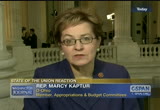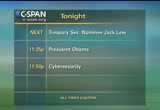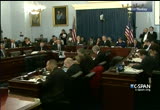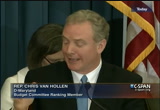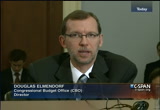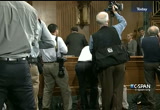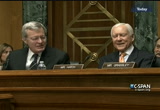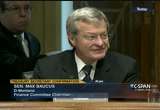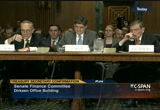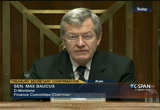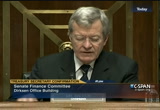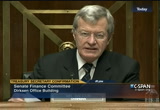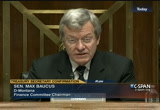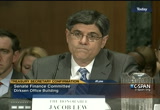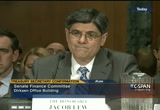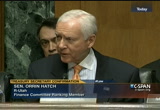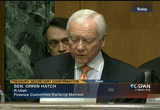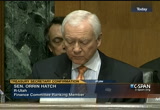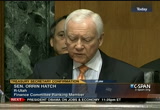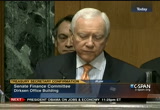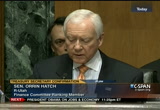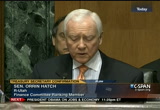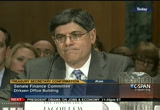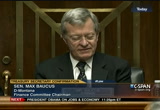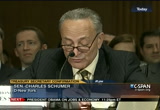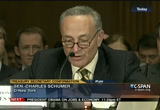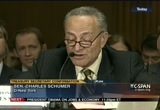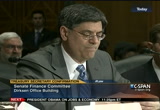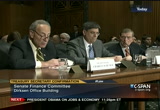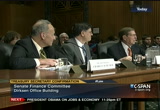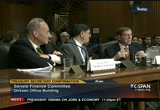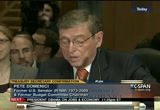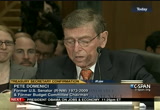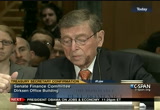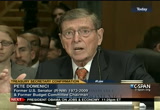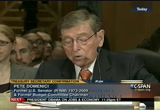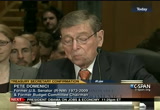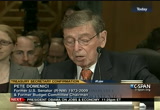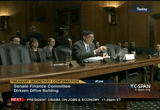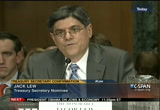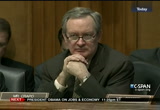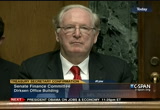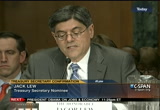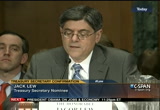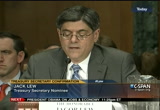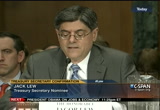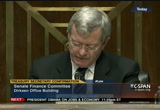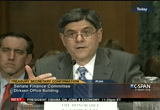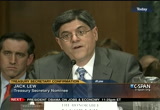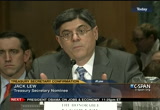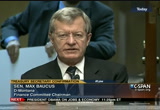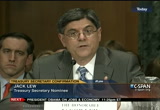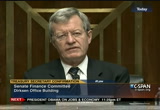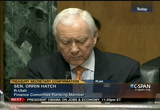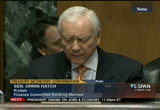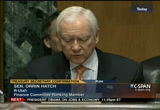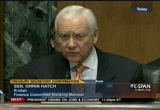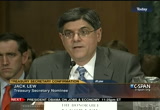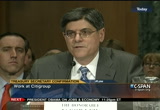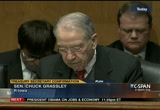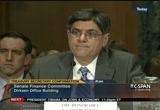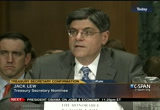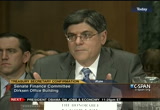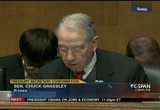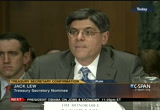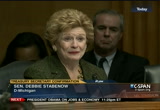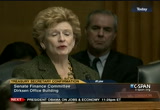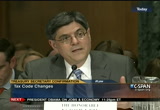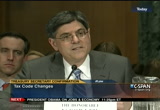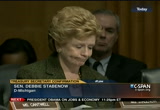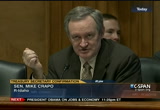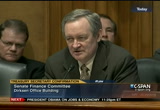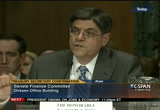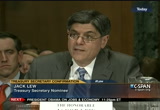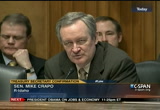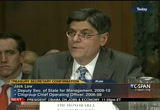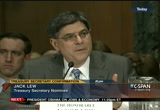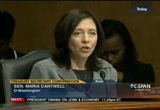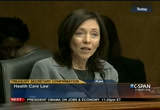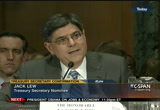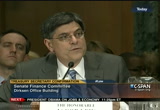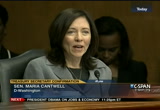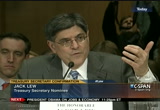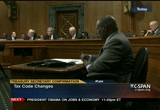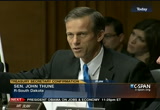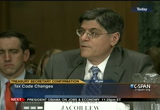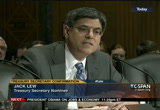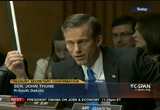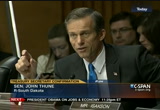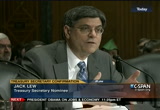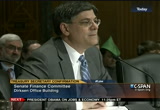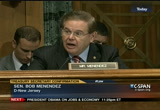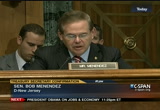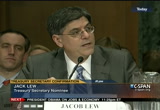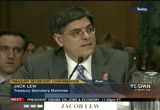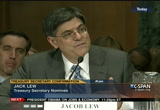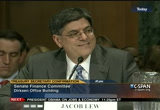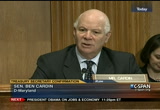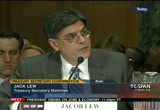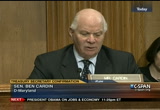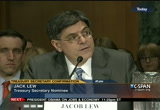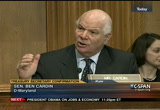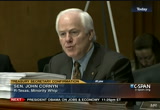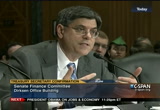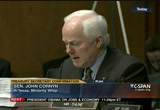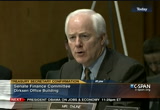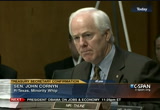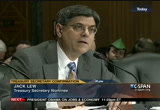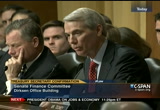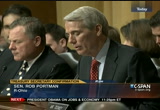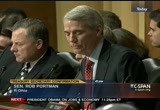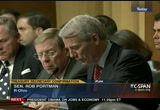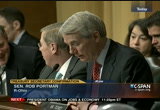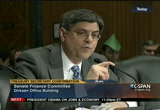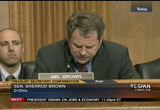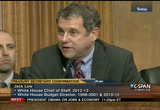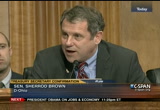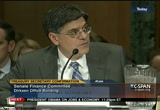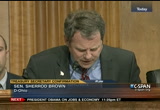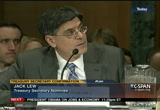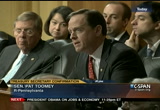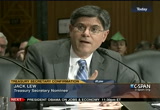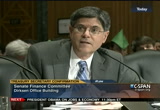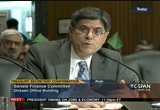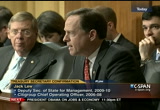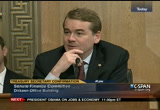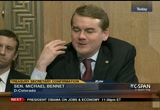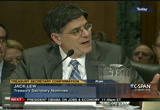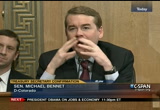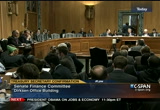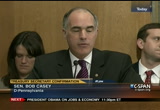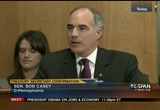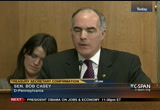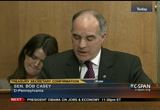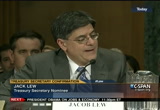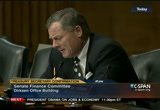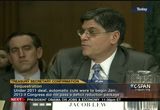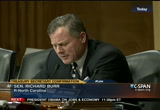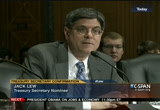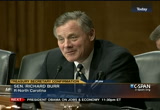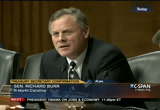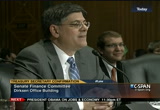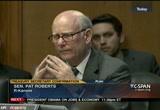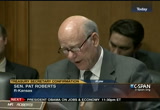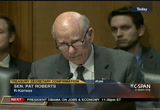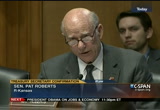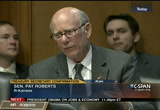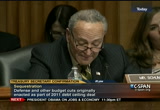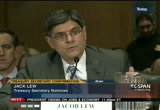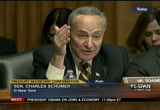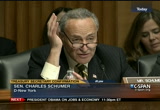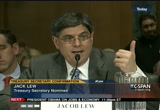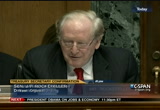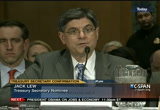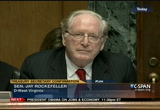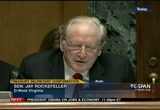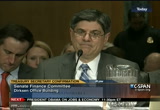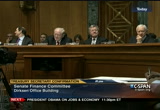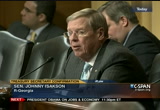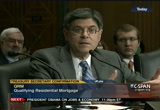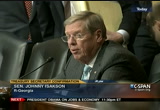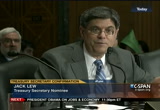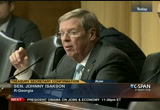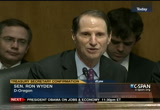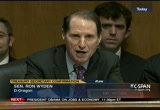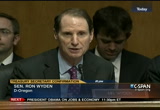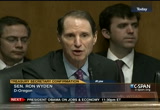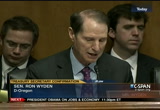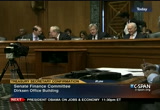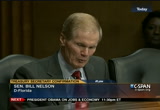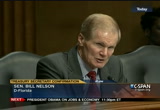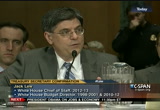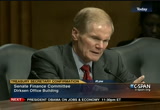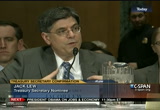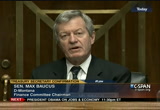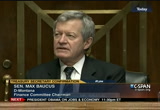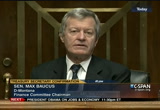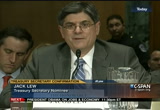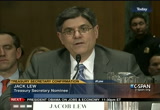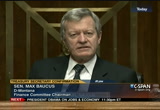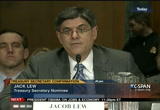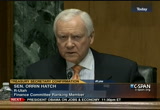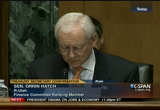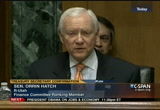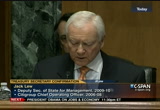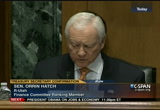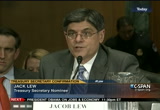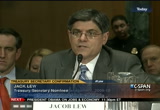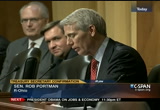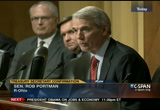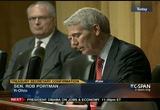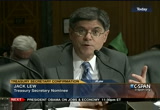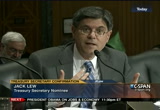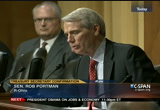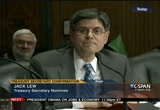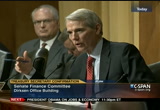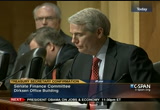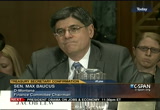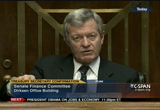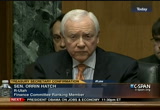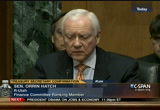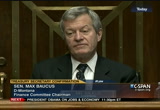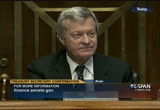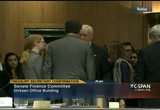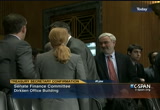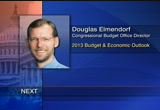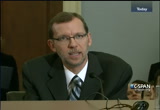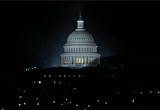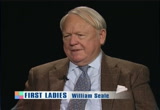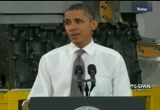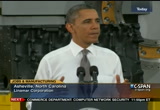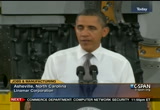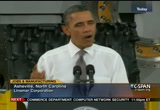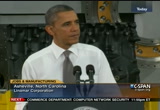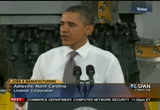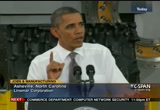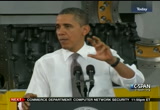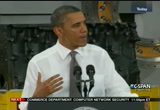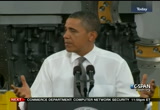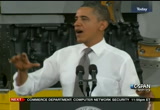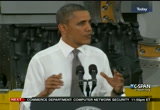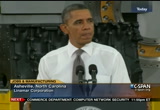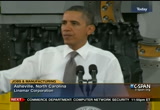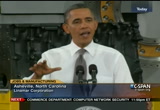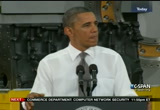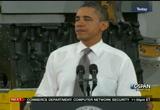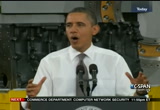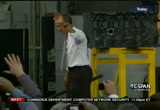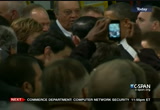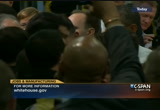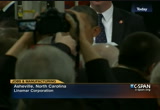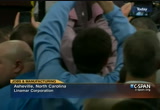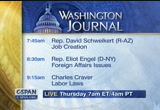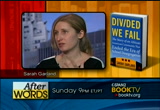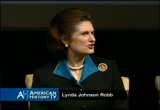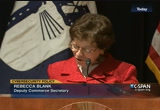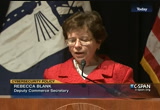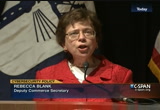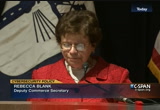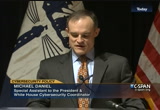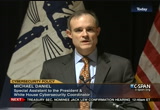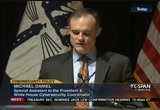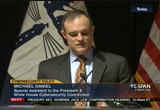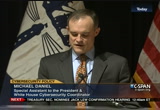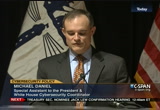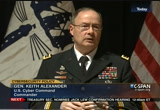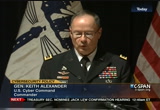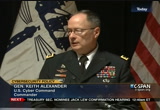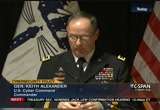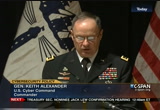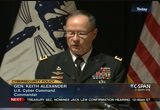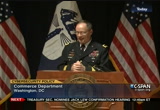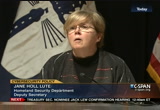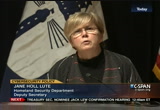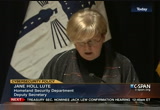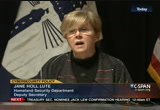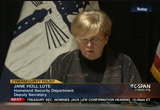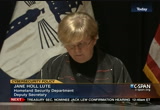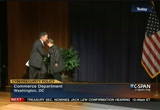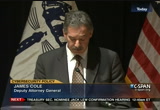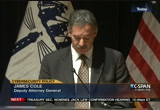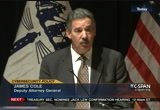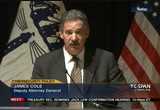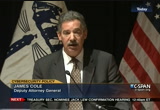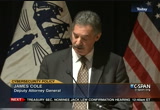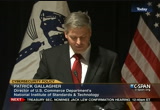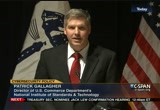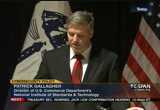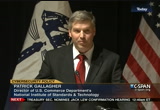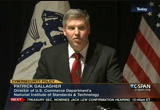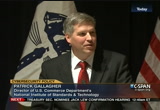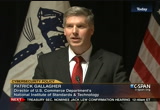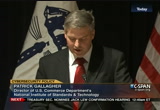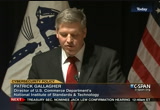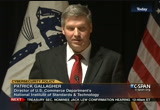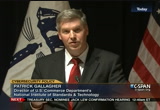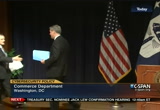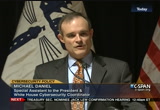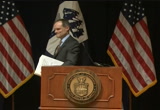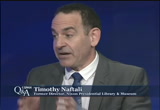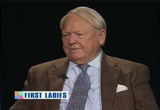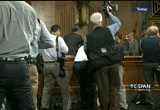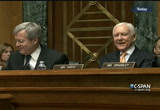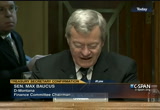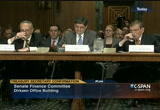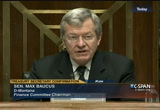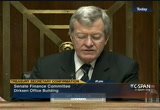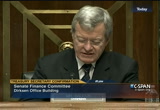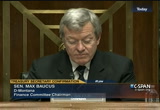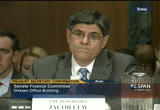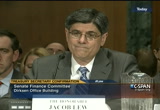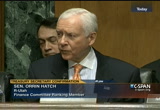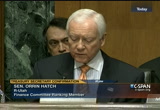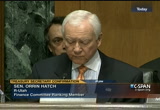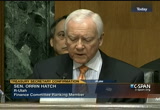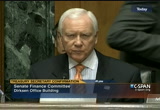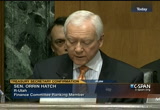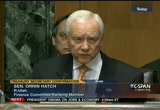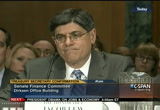tv Capitol Hill Hearings CSPAN February 13, 2013 8:00pm-1:00am EST
8:00 pm
-225-4146. we're there for you and for all all of your colleagues who served our country. host: congresswoman marcy kaptur, democrat from ohio. thank you very much for talking to our viewers on the next "washington journal" representative david s chweikert untaught creation. then foreign affairs issues, including the president pose a trip to israel next month area after that, a professor discusses the national labor laws. plus, your e-mails on a phone calls, and tweets. watch "washington journal" on c- span. >> on c-span tonight, as senate confirmation hearing for treasury secretary nominee jack lew. then president obama discusses job creation.
8:01 pm
and new guidelines on cyber security. we'll get to jack lew's confirmation in a moment. first the cbo director douglas elmendorf testimony. he warned of the sequester could cost 750,000 jobs. >> could you tell me in terms of the negative economic impact of the sequester, the .6%, what does that translate in point of lost jobs? >> our estimate is that the sequester alone would reduce gdp growth this year by zero point six percentage points. it would lower that gdp at the
8:02 pm
end of the year. we think that would reduce by about 750,000 jobs. >> 750,000 jobs between now and the end of 2013, right? >> right. >> that is a whole lot of jobs. we should be working overtime to prevent that kind of job loss. if you were to replace the deficit reduction through that austerity program, the cuts to the sequester with a plan that accomplishes the same amount of deficit reduction spread over the 10 year period, you would not have that hit on jobs? >> right. >> our analysis, the republican leader, mr. cantor had it right last september when he said
8:03 pm
that if we allowed the sequester to take place, unemployment would soar. it would set back progress on the economy. he cited an estimate that this of kuester would cost 200,000 jobs in this -- that the sequester would cost 200,000 jobs in the state of virginia alone. we were able to prevent the sequester for the first few months through a balanced approach. that should be the model going forward. just to be clear, there has been a lot of attention focused on the jobs lost because of defense cuts. .he cut in the nondefense a on the dollar for dollar basis, does that equal the amount of jobs lost? >> it is quite similar dollar for dollar. the timing of economic effect depends on the timing in which defense spending and nondefense
8:04 pm
spending occurs. there could be some small differences. basically, congressman, you are right. if the government is paying people to build battle shilps or structures, those will have comparable affects, dollar for dollar. but economy and on the output of jobs. >> you can watch all of this hearing on c-span 2 or any time at the c-span video library at c-span.org. for more white house if of staff jack lew is the nominee to be treasury secretary. at his senate confirmation hearing, he was asked questions about his tenure at citigroup and his cayman islands investment. this finance committee is three hours and 20 minutes.
8:06 pm
8:07 pm
very proud to work together. i'm happy that you are here with us to help move that tradition forward at a greater and deeper rate. we deeply appreciate it. less than two miles from where we sit today at the entrance of u.s. treasury building that is a large, bronze statue. one would assume that the figure is alexander hamilton. america's first treasury secretary. look again. this 12 foot tall statue is of albert gallatin. the longest serving u.s. treasury. in a to one, thomas jefferson asked gallatin to serve. --in 1801, thomas jefferson asked gallatin to serve here in the place of treasury secretary
8:08 pm
is more than avarice and response will -- laborous and responsible than any other. what did he do? he established fiscal discipline that was necessary a country into a great world power. gallatin also help orchestrate the louisiana purchase, doubling the size of the united states. his work is commemorated in gallatin county, montana and a beautiful gallatin national forest in the rockies as well as the gallatin river in missouri. when gallatin accepted the decision, it was noted at the time that he was placed in a situation of trust.
8:09 pm
today we are here to consider the nomination of jack lew to the nation's next treasury secretary. we are here to determine if he is worthy of the situation of trust. jack was a long and distinguished career established in academia and on wall street. during one assistance, he helped during one of the periods economic growth in america's history. we will learn more about his record. no doubt that he is experienced. as gallatin said, there is no more laborous position than treasury secretary. mr. lew will have his work cut out for him. our economy is on the road to recovery, but there are many twists and turns duri. gdp will be cut in half. the debt to gdp will be stable
8:10 pm
for the next five years. the budget control act of 2011 and the end here fiscal year -- has made a difference. progress has been made, but the job is not over. there are many tough decisions ahead of us. the first challenge is the sequester. across-the-board cuts that will start in over two weeks. then we quickly face a threat of government shutdown. sequester will cut critical programs including medicare, world development, and rural education. we have worked together to prevent indiscriminate cuts and lasting economic damage. the state of the economy is still fragile. unemployment rate rose slightly in january and is projected to stay high throughout 2013.
8:11 pm
these numbers are troubling. combined with a more favorable deficit numbers, the unemployment figures show that we cannot take our eye off the ball. that is the economy and job creation. mr. lew, you need to concentrate on three areas to create economic growth. first, focus like a laser on job creation. do not get distracted. as a leader of economic team, you must with and place ways to spark economic growth area unemployment is near eight percent. that is unacceptable. you need to develop new ideas to get a job creation and get rid of me less revelatory burdens. restore stability to our nation's capital.
8:12 pm
we need to get off of this roller coaster of crisis after crisis. these crises are frustrating of american people and it harms the economy. help us achieve stability and fiscal policy as economy continues to repair itself after the financial meltdown in 2008. that'll help give businesses and families certainty. finally, we must simplify our tax code for individuals and businesses. we need to make the system fairer and help make u.s. is this is more competitive in a global marketplace. as treasury secretary, you will be in a position to make reforms a reality. we will not need only your leadership, but your ideas and technical help. we are very serious about this. we will be counting on your deep experience to achieve comprehensive tax reform. over the past few years, this committee has been moving steadily forward on tax reform.
8:13 pm
become toox ratcode complex. the last tax code overhaul was in 1986. our world economy has changed drastically in the past three decades. i would tax code has not caught up. -- our tax code is not caught up. this is not some academic exercise. tax reform is a real opportunity to spark the economy and create more jobs. i expect you to be a partner as we tackle tax reform. members of this committee will probably ask you some tough questions. that is our right and responsibility. it is our role. i will ask you to address my concerns -- job creation. i'm confident that in the tradition of this committee, the
8:14 pm
questions will be respectful. if these questions focus on how to move our country forward and representing the people that we serve. mr. lew, welcome. i encourage you to embrace the challenge as you track your own path forward. recognize a great responsibility that you have and make sure our government finances are sound and this competitive economy a. >> thank you, mr. chairman, and welcome mr. lew. senator schumer, one of our great leaders in the united states senate. welcome to the new members of our committee on both sides. i think you will enjoy this committee. it is an important one. we look forward to working with
8:15 pm
all of you. >> thank you, mr. chairman. i want to thank mr. lew. i look forward to hearing his testimony. i look forward to hearing about his back rent and qualifications for this. it is an important position. the u.s. treasury secretary is charged with a variety of responsibilities. mr. lew, i know you're well- versed in budget matters, but that is not the main responsibilities. i have a good understanding of your budget abuse, including your opinion that we need much more revenue to address our nation's fiscal problems. i also know about the obama administration's relet dance, which i assume you share, to engage in structural structural reforms for the entitlement programs even though they are the main drivers of our debt and deficits. i do not share your views on
8:16 pm
some of these manners and neither do the american people, in my opinion. as a social security and medicare trustee, the treasury secretary cannot hope that these problems will go away. the treasury secretary has responsibilities that extend far beyond the budget. these response abilities include implementation of financial regulations and oversight of financial stability and debt management and tax election and oversight. the defense of the value of the u.s. dollar. assisting congress with its oversight responsibilities and to finish the oversight of entitlement trust funds. i understand your views on fiscal policy. i know far less about your knowledge and experience with these other areas. there are means that large
8:17 pm
amount of uncertainty in financial markets from the unknown aspects of dodd frank. hundreds of dodd frank rulemaking requirements are still in the works or have not been proposed it. meanwhile, lobbying continues with hundreds of meanings having occurred between banks and lobbyists on one hand and treasury and regulators on the other. whoever becomes the next treasury secretary should have a firm grasp of the financial markets and our financial system. dodd frank assigns his fonts ability for assessments and warnings about threats to -- assigns responsibility for assessment and warnings about threats to financial stability. that is chaired by the treasury secretary. the secretary plays a key role in the international financial spear. this is an area where we have seen a real lack of leadership from our administration.
8:18 pm
with no real us economic leadership, it is a vacuum. and we do not lead, other nations will. recent analysis shows that china has surpassed that u.s. as the world's largest trading nation. the president runs the risk of currency wars, which appears to be rising. it could put us back into a recession or worse. currency policy is not enough. without a good policy and a good -- the international monetary system will continue to be a threat. our future economic competitiveness depends upon the united states leading others to establish a fair and stable, transparent currency system based on market principles. i look forward to hearing your views about these important matters before the treasury.
8:19 pm
in addition, i understand that you have worked with managing director and chief operating officer of two units of citigroup. it is unclear what your exact role and responsibilities were there. so far you have indicated that you have coordinated on cooperations, technology, human resources, and maybe legal financial activities, but we know little about your knowledge of that committees -- activities of which you are the chief operating officer. some of the units of activity included trading and sales and marketing of risky investments. if you knew about the marketing and sales of these investments, it would be instructive to know what you do. if you do not know, it would be instructive to find out why and find out what your responsibilities were during her years at ci -- years at citi.
8:20 pm
these are important questions. if you are confirmed -- if you are confirmed, you will be responsible for overseeing the implementation of the very practices undertaken by the city units that you once operated. for example, you will be responsible for coordinating a limitation of the so-called -- volkcker rule. you have stated that you support that rule. if you are to be confirmed, it could lead to an awkward situation in which your rule as chair you would effectively be saying, financial firms, do as i say and not what i did. these are not trivial matters. if the committee was given time
8:21 pm
to examine your records more carefully before the hearing, i'm sure many of these impressions may have been answered. we would have to explore some of these matters here today. finally, i want to mention, i told you that i was very dissatisfied with the treasury department's level of responsiveness to our letters, both the chairman and mind, as well as letters from our colleagues. you pledged to made to maintain frequent consultation with members of this committee. i appreciate that promise. i want you, if confirmed, to be responsive in a timely manner. welcome to the committee. pleased to have you here. thank you for your willingness to serve. thank you for your past service. there is no question in my mind that you are a very bright and able person. mr. chairman, i look forward to an informative hearing. thank you. >> thank you, senator.
8:22 pm
senator schumer. mr. lew, i would like to give you opportunity to -- >> thank you, mr. chairman. i would like to introduce my family who is here today. my wife and my children are yo. >> stand up so we could recognize you and show our appreciation. [applause] >> these jobs take a lot of understanding. it is time-consuming. senator schumer. >> thank you, mr. chairman. thank you for the opportunity
8:23 pm
to introduce jack lew and for moving this nomination in a timely manner. i'm delighted and proud to introduce to this committee my friend and great new yorker, jack lew. no matter how many years he stays in washington, jack, who grew up in queens, a neighboring borough from where i live and his wife who grew up in my congressional district, will always have new york in their bones. i'm delighted to in dorset his nomination to serve as the next secretary of the treasury. -- to endorse his nomination to serve as the next secretary of the treasury. i do so heartily. he is renown for his managerial prowess and his common sense approach to solving tough problems. he is uniquely qualified to take the helm of treasury in these precarious, economic times as you so well outlined, mr. chairman. jack is no stranger to us. i met him there decades ago when
8:24 pm
i was a white find a congressman and he was a top aide for house speaker, tuple neil. we became friends -- tip o'neill. we became friends. he taught us a whole lot. i know that tip a tremendous influence on jack. it is clear that he shares the same work ethic and sense of duty. he shares another thing -- bipartisanship. speaker o'neill was renown for sitting down with president reagan and trying to work problems out. jack was heavily involved in that and continues to be. he is a bipartisan person who wants to be successful at working with both parties. you mentioned the issue with trust. there is no straighter shooter than jack lew. he is one of the most honorable , honest, and decent man in washington.
8:25 pm
when he gives you fax, they are back -- facts, they are backed up with research. from the time i knew jack when he started in tip o'neill's office, he would always outline both sides of the argument and give each without bias. he would tell you where he came down, but he always let you make your own judgment. that has propelled him to an extremely successful career that is -- that has made him qualified to become treasury secretary. he distinguished himself not only as a knowledgeable of the tax code in the federal budget, it also as an agile leader with a knack for operations. he rose to become a chief operating officer. in 1998, he was named director. when he left omb, it was the last time the federal government
8:26 pm
had a surplus. an unprecedented surplus of 236 billion dollars. it would not have happened without jack lew's leadership, knowledge, and expertise. in 2009, he answered the call to public service. he returned to d.c. to become deputy secretary for managing resources. he helped secretary of state clinton transform the state department and honing his skills in the international arena. skills that i'm confident will prove useful as he works to address the economic challenges he will be facing as treasury secretary. jack spent the last few years serving the administration as director of open be and as white house chief of staff -- as director of omb and as white house chief of staff.
8:27 pm
he brought nonsecurity spending to its lowest level since dwight eisenhower sat in the oval office. on the fiscal cliff, he kept taxes low on the middle-class. at the same time, decrease the nation's deficit by more than $700 billion. there are many subjects the treasury secretary must cover. not any treasury nominee can have expertise immediately in all of them. the jack has an uncanny ability to dive into a subject, learn, study, and master it in a factual and nonideological way. i look forward to working with jack and the rest of the economic team as we continue to focus on protecting the middle- class and combating our nation's long-term economic challenges. mr. chairman, i am confident that this nominee has expertise
8:28 pm
and work ethic necessary to excel as secretary of treasury. he will not be an ordinary treasury secretary. he will be a great one in the mold of albert gallatin and alexander hamilton, another new yorker, one who i never knew. [laughter] i fully support this nomination and urge that we move as quickly as possible so the senate and confirm this nominee and he can get on with the important task necessary to continue moving this country forward economically. jack, congratulations on your nomination. >> thank you. >> thank you, mr. chairman. likewise, i'm very pleased to be here. most of you know i left the senate because i was told by an eminent dr. -- but i have outlived that droctor.
8:29 pm
feels good to feel good enough to come out here and talk to you. it is nice that you leave me enough time to express that. i was sitting up in a little restaurant in santa fe, new mexico with some members of the statehouse. i got a telephone call from somebody i could not understand. there is a lot of noise. if you was not a wonderful guy, he probably would have dumped me overboard. i kept saying, who are you? what are you doing? after three or four times of exerting himself, he got out that he was tried to tell me that he would like me to come here today and introduce him. when it came out, i said, why did they we not do this a long time ago? -- why did we not do this a long time ago? senator hatch, mr. chairman, i
8:30 pm
happen to be a fan of hamilton. the next gentleman after him probably did more in the broad sense. it probably had problems, the second when you alluded to, the one that jack will handle. hisvery honored to endorse nomination to serve as the next secretary at this critical moment in our nation's history. certainly, i'm a senior fellow at the bipartisan policy center that was established a few years ago by former leaders. it is bipartisan -- nonpartisan and i'm a proud republican. i'm also former chairman of the senate budget committee, which many of you also served on. i completed my career here as
8:31 pm
chairman of the senate energy and natural resources committee. i will say to senator bennett, you may not think you are getting old, but clearly i am. i remember we have a bennett who was chief of staff of the budget committee. i was very young and at the bottom chair. he had the same name you do. it was your father. what a terrific thing to come here and see you today and ask .'s this. -- and expenses. -- and experience this. over 50% of the federal budget should put the country fiscal path for the future. this committee will play a critical role in achieving that role working with the president
8:32 pm
and with the secretary of the treasury. as you confront the fiscal challenges ahead, i cannot think of anyone more qualified or more ready for this job than jack lew. in only understands the challenges our country faces, but has the experience and judgment to confront them. as many know, jack has been a dedicated servant for many years. a servant of the people. what many do not know is where the dedication that she has originated -- that he has originated. i think it originated from his father. he was born in poland and moved to america. his mother's family made the journey from europe to america in a few -- a few years later. wereould say his family' among the fortunate ones.
8:33 pm
they let europe before it was too late. there is a deep love for the united states. it was a country synonymous with freedom, hope, and opportunity. a bulk of jack's career has been spent in public service. i first encountered him briefly. anyone who does not think that was a major reform needs to go back and look at the facts. that dedication of which he was hard of was a giant step that was taken to make social security. it was something real and not just to talk about. he has earned the trust of two
8:34 pm
presidents. he has overseen the budget of the entire executive branch into administrations. i know this firsthand. during the long and difficult budget negotiations in 1990, we work together to reach an honorable compromise and balance the budget. i can say without equivocation that jack was always willing to listen and work with members of both parties to find a common ground. as alice has said, jack is a very fair person. former secretary of the treasury rubin wrote to me to say, jack has the ability to understand complex matters quickly and well. good judgment to work effectively with administration, colleagues, and members of congress. that was told to me by bob rubin.
8:35 pm
qualities that our next treasury of the secretary needs to have it we will pull our country out of the fiscal mess that we are in. we talk about job creation. it is clear that we will get real job creation when we get real deficit reduction. i'm not here for that. i find jack to be a man of integrity. he works hard. he can be tough. as a negotiator, he is awful tough. he believes and plays it straight. we have had differences of opinion over policies, but we have been able to work through them. again, as alice says, the press keeps asking me anecdotes about .ack an
8:36 pm
i have worked with him many years. the truth is, she says, jack is not a funny comment anecdotal guy. he is just a dedicated, straight shooter. i guess you cannot be both. of the two, he chose the right one. congratulations on being a straight shooter. from my position at the bipartisan policy center, we look for to working with jack ahead and in reining in the healthcare costs and reforming the tax code to make it it a growth oriented taxation. mr. chairman and members of the committee, jack is a decent man, a serious policy maker who has all the right mixes of qualification, knowledge, and vision to serve as the next secretary of the treasury.
8:37 pm
it is my hope that you will approve his nomination swiftly. it is a pleasure to be with you all and with him. congratulations. >> thank you. >> thank you. thank you for the glowing statements. we all appreciate them. i'm sure that mr. lew appreciates it. thank you. ok, mr. lew. our usual practice is that statements will be submitted for the record. to summarize -- if you want to speak longer than five minutes, take your time. this is an important decision. >> thank you, mr. chairman and members of the committee should it is a privilege to be considered by this committee as the nominee to be treasury of
8:38 pm
the sect -- secretary of the treasury. thank you for the kind introductions. it has been my great fortune to work with them over many years. i'm honored that they were here this morning. i'm thankful to my family and my wife and my daughter who are here today. my son and my grandchildren. my public life divides -- demands much from the family. i appreciate the sacrifice and the missed family time. while my parents are only with me in spirit, i sit here because they instilled in me lasting values and the commitment to serve our country. .'m grateful to president obama it has been honored to serve and his cabinet and as his chief of staff. i'm humbled by his faith in me. thank you to the members of the committee for meeting with me over the last week and sharing your insights. this committee plays a singular
8:39 pm
role in defining our tax, trade, health care, and social security policies. with your collaboration, this committee is a clear example that bipartisan can produce real results for all americans. i pledge that if confirmed, i will maintain frequent consultation with you in accordance with that spirit of respect. this is a fundamental thread in my life. i took part in negotiations that led to an agreement with president reagan to save social security. under president clinton, i helped negotiate an agreement to balance the federal budget. i oversaw three budget surpluses in a row. my experience and senior leadership positions in government at new york university, where i have the highest honor the university has, the gallatin award after albert gallatin, who also founded and why you, it was the
8:40 pm
largest private university in the united states. working collaboratively is a universal challenge. when i returned to public service in the administration, i worked alongside secretary clinton to promote the national security and economic policies around the globe and reinvigorate american leadership abroad. at the office of management and budget, i worked with democrats and republicans to ask the budget control act. it reduced federal discretion spending to historic levels. as white house chief of staff, i appear to the princes -- i get here to the principle that we work for the american people. 11 saw that action -- principal -- we saw that principle in action. because of my experience, i approach the challenges that lie ahead with a clear understanding
8:41 pm
of their impacts the and significance. it does give me a profound respect and secretary geithner and others whose acknowledgments i'd knowledge today. when the president came into office, we have the worst economic crisis since the great depression. we need to reignite growth duri. our economy is in better shape today. over the past four years, the private sector has created more than 6 million jobs. rules are in place. taxpayers are not responsible for big firm fails again. the housing market is recovering and home values are stabilizing. we have isolated iran from the global financial system and establish the toughest sanction regime in history. we have sent a series of trade agreements to open markets for american goods and level the playing field for american
8:42 pm
workers and businesses. our auto companies are growing and innovating and creating jobs. we have made substantial progress reducing our deficit in a balanced way. we are in a better position today, but the work remains unfinished. our top priority is to strengthen the recovery by fostering job creation and economic growth while we make sure that our economy remains resilient to the headwinds beyond our shores. that means making it easier to tell american made goods abroad and expanded infection in the united states. that means working with our partners in the globe to bolster the system and promote economic stability. it means moving forward on reforms so the system is less vulnerable to crises. and it means reforming the tax system so that american businesses can thrive in tempe. at the same time, -- and thrive and compete. at the same time, we need to be
8:43 pm
on a path of fiscal responsibility. we can do even more to shrink the deficit over the next decade through a balanced mix of spending reductions and tax reform and sensible reforms to medicare that will help. even as a move forward, we need to make certain that there is room for critical investments in education, research, and infrastructure. things that we need to grow and compete. we do not want to derail the economic recovery. that is why we cannot allow the series of harmful automatic spending cuts to go into effect. these things would impose a wounds. in closing, i would like to make one final observation. and recent years, some have said that washington is broken and that our government cannot tackle the most serious
8:44 pm
problems and that the bipartisanship is a thing of the past. i disagree. i have reached across the aisle and formed honorable compromises my entire professional life. i have been involved in almost every major bipartisan budget agreement over the last three years. i could say that the things that divide washington right now are not insurmountable as they might look. we share the same goals. you want an economy that is expanding. we want a vibrant job market that gives anyone who works had the chance to get ahead. a financial system that helps families and innovators and entrepreneurs. a global economy that is prosperous and secure. we want a level playing field for american companies. we want a government that lives within its means. it will take a lot of hard work to achieve these goals. we have plenty of opticals -- obstacles, but we will find a
8:45 pm
way through today's challenges. i'm grateful to you for considering my nomination. i look forward to any questions you might have. thank you. >> thank you. i have several questions. questions we ask all nominees. is there anything you are aware of in your ground that might be found a conflict of interest with the duties of which you have been nominated? >> no. >> do you know of any reason that would prevent you from honoring responsibilities? >> no. >> do you agree to appear at any summons if you're confirm? >> yes. >> do commit to provide a prompt response in writing to any senator of the u.s. committee? >> i do. >> i'd like your thoughts on the
8:46 pm
tax reform. as i mentioned, the world has changed since 1986. i believe that this committee will engage in a comprehensive tax reform. it is our duty and obligation and also our opportunity. i like your thoughts on the vision we should focus on and actions we should take. i would like you to tell us how you would work with this committee as we reformed the code. what would you focus on first and second? i'm tax reform? >> -- untouchable? >> -- on tax reform? >> i was involved in the 1986 tax reform. i know how hard it is.
8:47 pm
i also know how important it is. you do not have to talk to many people to learn that the american people want tax reform. one is simpler tax code. they wanted to be easier to comply with taxes on an individual basis and know that it is fair and everyone is treated in a similar position. businesses want to go about their business without having to worry about complicated lawyer consultations. it is hard. the ways to do tax reform is to broaden the base and lower the rates. broadening the base means taking on a lot of very entrenched interests and lowering rates benefits everyone, but not concentrated with anyone individually. i think we can do it. it isn't working for -- i think we can do it. it is important. if there is a bipartisan consensus, there is an
8:48 pm
understanding how hard it is. i will try to get the job done. >> can you speak more about the base broadening? what areas do you think that we should focus on? you also mentioned that this robins and the lower rates. more details. >> senator, on the individual side, it is a hard thing to do to broaden the race. it is taking a look at things that are very much part of the fabric of how people live right now. as of 1986, that is the way you can go about tax reform. it is a lot harder than 1986. we have not completed the work on the fiscal plan. we have more -- we need to have more revenue. it will need to be done in an environment where as we broaden the base, we both contribute to deficit reduction and hopefully
8:49 pm
are able to lower rates. on the business side, we have a contradiction in our fiscal tax system. our statutory rate is high. our effective rate is not as high. when you look at the united states against other countries, it the statutory rate makes the u.s. look unattractive compared to others. for individual firms, their average tax rate is much lower because of all of the complicated provisions that are part of the code now. it would be a challenge to take on those individual credit. there's no way way to bring the rate down. that is something i think we need to do to maintain competitiveness abroad. >> you still believe that going down the road we need to reduce that to get the rate down? >> i do.
8:50 pm
when one looks at a table of international tax rates, it stands up at u.s. statutory rate is high. it is a complicated story to tell that the average rate is lower. it does not affect all businesses equally. we need a simpler tax code. >> could you briefly comment on something that was said in the press? that is your investment in the cayman islands. what was it? how did that happen? why did you choose that investment? what benefits did you receive? >> while i was in a play at citigroup, i had opportunity to make an investment in a private equity fund that was designed to invest in emerging economies around the world. it was an opportunity that look to me at the riskier than other investments i have made in the past. i have a very conservative investment philosophy. i thought it was appropriate risk given the possibility of a higher return.
8:51 pm
i invested in the fund as an employee and i divested from the fund when i was confirmed for an office in the government. my benefit was very small. i took a loss when i sold the investment. i reported all income and pay taxes that were due t. >> why the investment in the cayman islands? did you know it was came i >> i knew that invested in emerging markets. i do not know at the time but the address of the partnership was. >> when did you divest? >> 2010 when i became omb director. the fund was disclosed in all my prior confirmations.
8:52 pm
i'm not aware of any tax benefits i got from participating. >> where did you pay taxes on that investment? >> i reported all income related to the investment on my tax forms. i paid only taxes. i lost money on the investment. in fact, i lost money which i did not have a great deal of income. >> thank you. senator hatch. >> thank you. following the financial crisis, many lessons were learned, including citigroup have taken actions to include -- improve their responsibilities. my question relates to the time you were there. not the current citigroup operations.
8:53 pm
responsibilities as managing director and chief ynez officer at citi units. you have said to our staff that you were not involved in portfolio management. you may not have selected assets that citi tested and are managed in the photo, citigroup organization chart seems to identify you were tied to investment research and other such activities such as liquid operations. during her time on wall street -- during your time on wall street, there are units that you overstock. those securities include -- class b funding. it is a product that citi is
8:54 pm
represented and sold to collect these and then back against. others might have been sold that you oversold. some alleged were misrepresented to be far safer than they were. you have said that you are responsible for operational activities and management with some are little knowledge of the activities of the units that you .taffed duri i find that somewhat confusing. your position at citi is considered a trophy position. i hope he can provide some clarity to disprove that you -- i have four questions about your citigroup role of the time you were there. perhaps you should get your pencil ready. i will go through all of them and then you can respond. first of all, do you have any
8:55 pm
discussions or participate in e- mail exchanges, including having stock ofd on any funds? second, did you get an understanding of bank risk- taking activities from observing activities in the units you oversaw? or did you not know of any risky activities in your units? third, did you have any oversight role with respect to financial products that work launched and sold in your units? if so, did you do anything to curtail risky activities? or did you not know about the marketing and sales products of the units that you managed? in which case, i wonder what you did. fourth, while managing to provide efficiencies at the units you oversaw, did you use any services of citigroup the
8:56 pm
services what the website calls one of the largest providers of business outsourcing services within that thinking financial sector -- when the banking financial sector -- within the banking financial sector? >> let me start with my role. everything falls within that. i was chief financial officer first of the -- that was about two years. the alternative investment business. as the chief operating officer, i was responsible for a number of broad ranging management of the business kind of activities. i had substantial responsibilities in terms of large, national, and international field organizations. i mentioned to senator baucus one of the trips i had was to montana. i went around to make sure that
8:57 pm
our business was working on the ground. in new york, i was responsible for the budget of running the business, which is very large and international operation. i was not in the business of making investment decisions. i was certainly aware of things .hat were going on he i learned a great deal about the financial products. i was not designing them he. i take away from that experience a deep understanding that there are risks that we need to be on guard. i would be delighted to discuss those as we go forward. with regard to specific e-mails and phone calls, it has been quite a number of years. i do not recall specific number stations. -- i do not recall specific conversations. there were products were widely
8:58 pm
understood to be troubled. i was aware of funds that were in trouble. i do not have responsibility for the funds themselves, but i was aware that those difficulties were going on. >> my time is up, mr. chairman. >> next senator on the list is senator schumer. he is not here. senator grassley, you are next. >> already? >> yep. >> mr. lew, i january 16, two thousand nine, citigroup announced losses of 18.7 million dollars. they also received a federal bailout through the loan guarantee on mortgage assets. one day later you received a bonus from citigroup for over
8:59 pm
$940,000 for your work as chief operating officer on the alternative investment units which was responsible for much of the loss. were you aware that citi grant -- citigroup was about to receive a guarantee when you receive your bonus question mark -- bonus? why is it acceptable to take post the main dollars out of a company that was functionally insolvent and about to receive $1 billion of taxpayer support? >> in 2008, i was an employee in the air here in -- private sector. i was compensated for my work. i will be for others to judge. for others tothat judge. >> president obama said, on the
9:00 pm
campaign, i used to talk about the outrage of a building in the cayman islands that had over 12,000 businesses. either this is the largest building in the world or the largest tax scam in the world. do you believe the president was accurate and referring to the building which housed your investment as "the largest tax cam in the world?" >> i am happy to answer questions about my own investments or about tax policy regarding the sheltering of income from taxation. i reported all income i earn, paid all taxes due. i strongly believe we should have tax policies that make it difficult to shelter income from taxation. >> there is a certain hypocrisy and what the president says about other taxpayers and your
9:01 pm
appointment, but let me move on. you have told finance committee staff that you were unaware of the association with tax scams. that makes me wonder where you have been for the past eight years. the chairman of this committee highlighted the house to the nation several times. president obama preached about it. it is no wonder that maybe you and the president have not proposed legislative solutions to what the president considers a tax scam. how can you either president's top tax enforcer if you have not heard of this offshore loophole? >> is committee has reviewed my taxes for many years. it is clear that i reported all income i have earned. i pay taxes as appropriate. i
9:02 pm
believe strongly that people should pay taxes on their income. i have strong views on how the tax code should be constructed to encourage investment in the united states, and i am happy to answer policy questions. >> oakland house ought to be shut down? >> i am not familiar. >> let me move on. the case filed in the new york state supreme court in which nyu is the plaintiff states that at the same time you were executive vice president, new york university invested in the arial font, a cayman -- arerial fund, a cayman islands investment company. nonprofits sometimes seek to
9:03 pm
avoid paying taxes on unrelated business income through offshore vehicles like funds and the cayman islands. are you or the executive vice president -- when you were the executive vice president did nyu have invested -- investment in the cayman islands to avoid paying taxes on unrelated business expenses? >> when i was at nyu, i was not aware of any policy to invest in the manner you describe. i was in no discussions regardeing -- i was involved in discussions about making sure the endowment was invested to have as good a return as possible. the goal at nyu was to try to have a diverse part folio -- portfolio. >> i will close with this collusion, since you are unaware of it and i take you word -- i take your word for it. it is a poor reflection on your
9:04 pm
tenure if you did not know about these wer investments. you are paid about $8,000 more than the actual president of nyu. i am surprised you did not know what was going on. thank you, mr. chairman. >> thank you very much, mr. chairman. welcome back. i understand this is your sixth confirmation hearing, so you are a glutton for punishment. we welcome you. we thank you for your service. i am optimistic, listening to the concerns about closing offshore loopholes. i think we may have something we could do together to offset sequestration. it would be wonderful to work together on something that would close loopholes that clearly we are seeing bipartisan concern about today. i would love to work with members on it. i would like to talk to you about one of my favorite
9:05 pm
subjects, which is growing the economy with manufacturing. i was pleased to hear the president's comments last night. we all know that manufacturing has been leading the recovery in growth. when we look at tax reform and what we need to do to be competitive internationally, i am interested and concerned to make sure we continue to make things in america and innovate in america. i wonder if you might speak to how we, in tax reform, encourage making things in america, things like the section 199 manufacturing deduction -- how can we make it more effective, as well as the r&d credit. what would you see in terms of being able to continue to innovate and make things in america and focus on that and tax reform? >> think you, senator.
9:06 pm
i think one of the real reasons for taking on tax reform -- i would say the major reason -- is to help grow the economy, create jobs, and improve the environment for manufacturing. right now we have a tax code that has a lot of provisions and ofefits -- manufacturiners one kind or another. but they are quite complicated. the tax those suggest we have a high statutory rate for income. if we approach business tax reform from the point of view that our goal is to try and simplify the system, that is immediately going to help businesses because right now businesses have to start by spending money on accountants and lawyers just to get started here it can simplify it and lower the bar. secondly, as the president outlined in his proposal last year, we ought to have a
9:07 pm
preference for manufacturing in the reformed tax code. the challenge is going to be that we all know a tax code which has a broader base at a lower rate is going to be one that makes it more attractive to invest in manufacturing, but we also know that it is hard and each of the individual provisions in the tax code is important to one or another industry. it is going to require working together to do it for the greatest good of the economy and the american people coming even if it means taking away some of the benefits. on of the things we've focused on is taking away the incentives for things -- oil and gas expiration cannot move offshore. the resources are here. we need to look at what enters
9:08 pm
into the business decision when you choose whether to locate in the united states or overseas and have the tax code be helpful not hurtful. one of the things that has been encouraging in the last few years is, even with the tax code as it is, or and more businesses have been deciding to invest in the united states. the quality of our work force, the stability of our system, makes the united states an attractive place to invest. if we fix our tax code, there is no limit to how much we can grow. >> we have about 17 million people that work in our country because of manufacturing, 16 million because of agriculture. if we vocus on making things and growing things, that is the foundation for the economy. -- if we focus on making things and growing things, that is the foundation for the economy. >> we have worked hard over the last four years pursuing multiple paths to help homeowners refinance or modify loans.
9:09 pm
one of the things we would like to do, as the president addressed last night, is enable homeowners who are paying their bills, underwater through no fault of their own egos of the financial crisis, to be able to refinance. right now you have got homeowners locked into six percent, seven percent, eight percent mortgages when they should be able to get 3.5% or four percent. >> thank you very much. >> tank you very much, mr. chairman. mr. lew, i appreciate having you here today. i want to continue our focus on tax reform. in my work with the bowles- simpson commission and other areas and trying to address putting together a comprehensive dextran -- - copperheads of debt reduction package, i do tax
9:10 pm
reform as a key part of that. not because of the need to raise revenue, which is where we may have some disagreement, but because of the need to generate growth and have a pro growth element in the recovery effort in dealing with our debt crisis. that is the first part of the parish -- first part of the question. to me, in the last few months, the deception -- the discussion over tax reform has taken a concerning turn. i have heard the term tax reform used to frequently -- too frequently to be a revenue venerating device. tell me why you believe tax reform is needed in our economy. >> thank you. as we discussed in the conversation we had, i consider
9:11 pm
it a lost opportunity in december and january that we did not get to a final agreement on our fiscal challenges so we would be able to make tax reform after resolving the fiscal challenge. there is more work to be done in terms of the fiscal path and we need more revenue to be part of it. there is a need to do tax reform separate from that. in clearing out the tax code and broadening the base, there is room to raise the revenue we need. a few months ago, it was a lot of discussion as to whether or not we should raise tax rates or raise revenue by broadening the base. we did the tax rates. we did not broaden the base. there is room in the conversation for both. i would look forward to achieving the goal. equally importantly, perhaps more, having a tax code that make sense for individuals and businesses, so we have a writing
9:12 pm
investment environment. >> i agree. we would have been hard-pressed to create a tax growth -- tax code that was more unfair, complex, expensive to comply with him and more anticompetitive to our own business interests. we need to correct that, and i look forward to working with you on that. to look at the corporate side you discussed, we need to lower the statutory rate. i agree. you have a target rate in mind russia mark i know a lot of us -- do you have a target rate in mind? i know a lot of us have talked about 25%. >> we do not have the ability to lose revenue as we go through business tax reform. i think it is challenging to get all the way to 25%, but the more aggressive we are in broadening the base, the more progress we will be able to make. >> do you agree, on the
9:13 pm
corporate side, we should be revenue neutral? my understanding that in the past we focus on the corporate rate being revenue neutral. >> i think the important thing is to have the tax code be simplified and consistent with a more robust investment retirement -- investment environment. i think it can be done in a revenue neutral way. i do not believe we have the ability to raise the revenue we need to deal with the fiscal problem and have it cost revenue in tax reform. >> many have made the argument that we need to pay close attention to the individual code with regard to its impact on business taxation. do you think we can do corporate reform without doing -- without also doing individual tax reform? >> i think we could, but it would not be the best way. the best way would be for us to
9:14 pm
do individual and business tax reform. we have a combination of different forms of business organization. the closer we get to a place where the corporate tax system is one that is open for more business, the more competitive we will be. we need to keep both in play. right now, the challenge is are many, but once we are doing tax reform, we should do it right and do both. >> i wanted to get into some dodd-frank issues, but my time is running out. on corporate reform, are you open to negotiating a competitive territorial system? >> as we lower our rate, we ought to be looking at having a minimum worldwide tax rate where we are trying to level the playing field. we have a debate between whether we go one way or the other. we have a hybrid system now. it is a question of where we set the dial.
9:15 pm
there is room to work together. >> thank you. >> thank you. senator calloway. >> congratulations on your nomination. it is great to see your family here today. i have a lot of fiscal, financial questions for you. you mentioned in your opening statement about medicare and getting the delivery system right. the president last night mentioned that as well, focusing on quality. i was curious -- were you involved in the discussion of the implementation of the affordable care act? >> as chief of staff, i did pay attention of the implementation of the affordable care act. implementing it is necessary in order for it to be in place. >> do you think that if there is a provision of the affordable care act that is supposed to be
9:16 pm
implemented in 2014 at it should be implemented in 2014? >> we have been working hard to the on schedule, and having the affordable care act in place in 2014. many departments have been involved in that. the department of hhs, the department of labor, personnel management. we had to work hard to get the funding to implement on schedule. but i feel we are in a good place. >> one provision that is not being implemented, the basic health plan. i know the president tried to expect -- express an opinion to push things along. do you think if the affordable care act specifies it should be implemented in 2014 that it should be implemented in 2014? is there bias in the administration against lower- cost, managed care delivery system that the act calls for? is there a bias that somehow the
9:17 pm
affordable care act means implementing only those pages related to the exchange and punting everything else, even though they have been more cost- effective delivery systems? >> i am not aware of any such bias. i know there has been an enormous amount of work to get the exchanges set up and the various parts of the architecture. i would be happy to follow up and work with you on that issue and find out where it is in the queue and follow-up. >> i would greatly appreciate that. there is a big concern on my part and other members that somehow people may be asking states to forgo what had been more cost-effective solutions for that population just above the medicaid level. in exchange, and almost making it more expensive and putting those states, pushing that population onto the exchange is some holy grail. we think it should be
9:18 pm
implemented and should be implemented now. i will take you up on that. i want to turn to financial issues. we have had a chance to talk. just so everyone understands your philosophy on the regulatory side, do you believe in the reimplementation of glass-steagall? >> glass-steagall has been, over the years, something of an anachronism. much of the activity in the financial world has gotten beyond it. i think the problems we had in leading up to the financial crisis were evidence that our financial regulatory system did not keep pace with the growing complexity of the financial system. dodd-frank was a critically important step to reasserting proper regulatory oversight of
9:19 pm
an industry that is critical for the help of our economy. as we go forward, we have to ask russians as we complete the of fermentation -- complete the implementation of dodd-frank, if more is needed. while i am a student of history and new deal history in particular is a great interest to me, i do not think that necessitating a 1930's statute -- >> i will take that as a no. to that point, i do not see how you contain this issue as we now see the cftc and the treatment of swaps and futures as different clearing measures. are you not worry that that will provide more systemic risks? >> if you look at the issues -- things like margin requirements -- it is important we get on top of regulating things that create systemic risks. i did not mean to be asking -- answering the entire question
9:20 pm
yes or no. it is more complicated. the question of is there a need for are the consideration of financial regulation is one that comes in sequence after and lamenting dodd-frank. i ha comeo the issue open minded knowing that we cannot let what happened in 2008 again. we cannot let a regulatory system become outstripped by financial system which are regulatory life depends on. >> two more issues. i do not understand the administration's idea of capping the municipal bond tax reduction to 28%. if we want to encourage more investment, i believe the federal government provides cheap capital. when all of these banks are putting monies into derivatives, you cannot convince me they are interested in the bottom line.
9:21 pm
the policy on tapping the municipal bonds at 28%, tax- exempt bonds, i am curious as to whether you are going to continue that policy. on the ford investment on real estate act, whether you're saying -- on the foreign investment of real estate act, whether you're saying that treasury department will take action. >> the administration's proposal which would have limited the value of deductions in the top tax brackets to 28% was trying to restore some equity in the tax code and generate revenue we need for meeting our fiscal targets. it was not specifically directed at municipal bonds and other specific areas of tax activity. it was also meant to be a placeholder. we really should have tax reform and make specific policies deciding what is in or out and what the proper tax rates are. we put it in as a fallback, saying that if tax reform does
9:22 pm
not happen, this would help us get to the revenue targets we need. i would be happy to follow up with you on these issues of the individual component parts of tax reform. the hard decisions in tax reform will, in many cases, put us in places where there are things that many of us are sympathetic to where we have to curtail tax benefit if we're are going to broaden the base. if there were a lot of easy decisions, tax reform would have happened a long time ago. >> on the foreign investment, is that something you're going to take action on? >> my understanding is that those rules are progressing. i would pay attention to them and work on them and work with you to get them completed. >> enqueue, mr. chairman. thank you, mr. chairman. >> i want to come back to an area where i think there is room for republicans and
9:23 pm
democrats to work together. that is the issue of tax reform. i have on my right are the 1300 pages debt, the last time we did tax reform, the white house and the administration put forth in terms of their recommendations. in november, 1984, we talked about this. you are familiar with these documents. the contrast -- contrast that with the paper that the white house put out, which is -- this is 25 pages. it is a corporate tax reform for bozo. my --corporate tax reform proposal. administration is going to have to do a better job on tax reform if we are going to be able to deal with this issue. the president talked about, last night, tax reform and the need for it, but he does not give us details. he said he supports lowering
9:24 pm
rates for businesses that create jobs in america. does the president, when he says that, agree that rates need to be lower across the board for all taxpayers? there are lots of small businesses that that file on individual tax forms and pay at the individual tax rates. should tax reform conclude the lowering of rates on individual taxpayers as well as the corporate rate, which i think you have already addressed with the senator'sto question? >> to proceed on tax reform, we will have to work together, the executive and legislative branch, and on a bipartisan basis. it will be at the top of my priorities to do that. the best way for an administration to engage -- i remember treasury one and treasury to. -- treasury two.
9:25 pm
tax reform in 1996 did not follow treasury one or treasury two. it was worked out with the chairman and the secretary of the treasury through conversation and the kind of regulatory process we will need to follow again if we are going to succeed. i remember a lot -- not that long ago when i produced a pile of paper that was the health security act. it did not lead to healthcare reform. president obama sent a much shorter document to congress, it ended up going the full distance and getting enacted into law. the question is how do we get something done. the means to the end, i am flexible on. i am open to suggestions on how we can work constructively. the question of rates -- we are going to have to work hard to broaden the base to lower the rates and meet the revenue targets we have. but i think it is possible.
9:26 pm
if we roll up our sleeves, we can get our fiscal house in order and work on the rate structure. it will depend on how much we are willing to do. >> i understand the whole issue of health care reform legislation and the concern about too much specificity, but this is not going to get done in less there is leadership by the white house. this is a big issue. there a lots of constituency groups that are attached to the current tax code. i am one of those that believes we should do away with the tarp and do what simpson-bowles suggested. i figure out what we want to add back in and adjust rates accordingly. the goal should be getting the rates down and promoting economic growth. i hear the president talking about raising revenues through tax reform. if you get economic growth, you will get new revenue am a but
9:27 pm
you will get it the old- fashioned way and create lots of jobs and get the economy expanding again. i am suggesting there has got to be more leadership than this when it comes to this issue. one other question. i raised this with you as well when we had our meeting last week. the president, he talks about entitlement reform. we have talked about the need to address what is the long-term driver of debt and deficits. that is our entitlement programs. but there is not the specificity there. the president has talked about $400 billion. if you think about $10 trillion in deficits just in the next 10 years, $400 billion looks like a drop in the bucket. where is the specificity on it comes to addressing what i believe, and i think what most
9:28 pm
of us agree, is a spending problem. revenues and spending and gdp are going to be back up averaging 18.9%. we have a spending problem. there is no proposal that addresses that in a meaningful way. you look at the budget he submitted. it did not receive a single vote, republican or democrat. they are not serious. i hope that you will engage on this issue of trying to do something about what i think is a huge problem for our country's future, and that is this massive debt. >> i could not agree more that we need to deal with our fiscal challenge. i may disagree that it is a combination. we have a deficit problem and we will need to solve it with a combination of spending reduction and restoring revenue. that is the kind of thing where we can have a discussion and figure out the balance. the president says it should be 1. to
9:29 pm
there were a mix of different approaches. some more on the beneficiaries. some more important -- were a burden on those who could afford to pay their medicare. there's going to be a difficult discussion at some point on what the right mix between those approaches are. the president in december offered to increase to $400 billion the savings in medicare. we are prepared to engage in specific ways to do that. the sooner we put the fiscal frame together, the better. to get certainty in the economy and be able to move on and create jobs. >> thank you, senator. next is senator menendez. >> thank you.
9:30 pm
mr. lew, congratulations on your nomination. in the cri ideas confirmation hearing as the omb director, there were serious questions raised about deregulation at approximate cost of finding -- the approximate cause of the financial crisis. some of the responses you gave raise some concern. there is a difference between being the omb director and the treasury secretary. the wall street reform is giving the treasury secretary -- has given the treasury secretary of much stronger role in financial regulation. i would like to give you the opportunity to put those concerns to rest. the you believe stronger regulation of our financial sector is necessary? moving forward, if you were to be confirmed, do you support a full and robust implementation of the oversight rules of the dodd-frank law? >> i very much
9:31 pm
believe that dodd-frank was necessary, that we needed to modernize the regulation of the financial services industry, and i think the oversight provisions in dodd-frank need to be implemented. if confirmed, it would be extraordinarily high priority. on of the other things you will have in your put olio is the implementation of sanctions. as the author of the iran sanctions act, i am interested in making sure that treasury pursues the law that the congress passed nearly unanimously. and that the president signed. as our last peaceful diplomacy tool to prevent iran from achieving nuclear weapons. would you ensure the robust
9:32 pm
enforcement of the sanctions that we have given to the president and that a large universe of them are within the treasury department? what yes. -- >> yes. i think our sanctions are unilateral sanctions. ringing the world community together for multilateral sanctions have put in place the strongest sanctions in history. i have some hope we might be able to resolve the issues we have with iran peacefully. the sanctions are doing what they need to do. it is crushing the iranian economy. gdp is down. the value of their currency is down. unemployment is up. inflation is up. all he had not seen as whether that has changed the mind of the regime so that it is ready to, and a diplomatic process, give up the pursuit of nuclear weapons. that is the goal. the president has made clear it
9:33 pm
is unacceptable for iran to have nuclear weapons. all options are left on the table. i firmly believe these economic sanctions are far preferable to war, but we must pursue them vigorously. >> with reference to the president's state of the union speech, what he talked about was a growing economy, that growth is an essential revision of achieving some of the deficit questions as well as the job opportunity questions. what do you see -- i read your your testimony -- what do you see yourself, as the role of the treasurer of the united states, in being part of creating that growing economy? >> the secretary of the treasury is the senior member of the president's economic team. i worked on economic teams from various perspectives. one of the things i think is most important for the treasury secretary to do is always ask what what can we be doing to get
9:34 pm
the economy moving. what can we do to help create an environment where jobs will be created? or can we do to create a possibility that every family that is willing to work hard has the chance to get a decent life? i think there are many things we can do. i am an optimist by nature, but i also believe you have to keep working at it. the president proposed the american jobs act. last night, he thanked congress for adopting a few of them and urged congress to enact the rest. i believe that, in the short run, investments in infrastructure makes sense. investments in keeping teachers and firemen from being laid off makes sense. in the longer term, we have to get our fiscal house in order, but we cannot shortchange the investments to build the economy for the future, things like infrastructure, education, skills training. we have the best workforce in the world, the most vital
9:35 pm
economy in the world. in order to be there in the future, we need the r&d and the people and the infrastructure. that is got to be in conjunction with fiscal policy that we can afford. bu>> i hope you will also put n that universe something the president mentioned in his speech, which is mortgage refinancing. i cannot understand why we would not let thousands of american families refinance, lower their rates with the it starkly low rates, and unlock the universe of solidified homeowners, but also economic potential. >> i could not agree more. the work you have done is important. >> thank you, mr. chairman. thank you very much for your willingness to continue in public service. we congratulate you in the nomination. i think your family because this is a family sacrifice. you come to this hearing with an incredible background for public
9:36 pm
service. i want to underscore one i think will he helpful. that is your work in the house under tip o'neill. you were part of the efforts to reform our social security system and tax code, both of which require bipartisan cooperation. the white house and congress were under the current -- under different parties. we need that desperately today. i think you will be well suited to bring to get -- to bring together democrats and republicans. i want to touch on one or two points. i would like to deal with problems that have been brought to our attention about small businesses and access to capital. we have had several initiatives to try to help small businesses gain easier access to capital to expand job opportunities. with the concerns of community banks -- and we have seen a lot
9:37 pm
of community banks being merged into larger banks -- there is a real challenge for a small company to be able to get access to capital to expand our economy. do you have thoughts as to how you, if confirmed, can help ease the burdens that small businesses have been getting access to capital? >> in the aftermath of the financial crisis, one of the big challenges has been to get capital flowing again. we have two problems. one is that there are businesses that have a lot of cash on their balance sheets and are not investing. and we have financial institutions that have been slow to get back into the lending business. we have seen progress on the opening of the state it's in lending. it is going to be on ballots. we have to make sure that financial institutions are sound, particularly larger institutions do not get in a situation where they create risk to our tax system. for community banks, many of the
9:38 pm
new laws and regulations were written to treat them differently. small institutions do not have the same regulatory burdens, the same reserve requirements, that large institutions do. i look forward to working at you and others on this committee to make sure we implement the laws in a way that helped it capital flowing. -- that helped get capital flowing. >> i am not blaming the administration or congress. i think collectively we need to do a better job of helping small businesses get the access to capital that we attended. into many communities it is not not taking place. i want to turn to a subject dealing with our national exchange rates. we work in the house on dealing with our national savings issues. during the best of times, savings rates were low. it is important for our economy
9:39 pm
to have private savings. it is important for individuals for retirement security, taking pressure off of a lot of the public lands. one of our concerns is that, as we look at tax reform, there is efforts been made to diminish the texas senate's -- the tax incentives for companies to set up retirement plans. that could be counterproductive. what you are doing is talking about the timing of tax revenues. on a long-term basis, we are accelerating tax concessions -- accelerating tax collections. would you work with us and do you have suggestions as to how we can improve opportunities for individuals to save for their retirement? >> i believe it is important that we have policies that encourage individuals to save for their retirement. we have long viewed our retirement system as being something that depends on the combination of social security pensions and savings.
9:40 pm
we are in a new world where pensions are a smaller part for many people, which means that savings are going to have to pick up more of the burden. we have had rules that could have been simple five. there are proposals that the administration has made that people will have to opt out, as opposed to lock into retirement savings. that is viewed as something that could increase people saving for retirement. i look forward to work with you and others to think through these ideas. >> we talked about the delivery system reform and the healthcare system. it is frustrating because we know we are moving toward a better and more efficient health care system. from -- the problem is how do we do it in a way that we know we will get the savings we need. your experience in the white house and as treasury secretary puts you in a unique position where we can try to deliver a more efficient health care system for the american people. >> good morning.
9:41 pm
as you know, the medicare board of trustees on which the treasury secretary serves, mucst decide whether the revenue -- this is sometimes called the medicare trigger. you and i talked about this in our meeting in my office. these funding warnings have been issued since 2007. president george w. bush submitted a proposal pursuant to the ricardo -- to the requirement of the statute, which says that when this funding warning is triggered, the president is required to propose legislation within 15 days to reduce spending below the 45% threshold. president obama has never submitted a proposal pursuant
9:42 pm
to that legal requirement, has he? >> i am familiar with the report. i know that the acting ob director has written to you on a. it.o you on the view, as i understand it, is the report is not one that was constitutionally required of the administration. they bomb and tailoring -- they voluntarily submitted it. the budget we submitted has had significant that a care -- significant medicare savings proposals. >> so the administration has taken the position that is unconstitutional? >> i understand there is a signing statement in the bush administration that is inconsistent of the recommendations clause of the constitution. >> the obama administration has never submitted a report, correct? lex we have submitted medicare
9:43 pm
savings proposals, which if enacted, would resolve the issues. in 2013, we will be out of that zone. percent the -- specific proposals the administration before it has addressed the substance of the issue. >> i hear you saying they have submitted other bozos you think are satisfactory, but it does not comply with the statute. congress has passed a no budget, no pay bill, which says that if congress does not do its job and pass the budget, it does not get paid. i would submit that maybe it would be appropriate to say that the office of management and budget not get paid unless they comply with a statutory mandate under the medicare trigger. last night, the president talked about energy production, which i was gratified to hear about. my state has seen job growth go up 32% since 1995, compared to
9:44 pm
12% for the nation as a whole. a significant part, it is because of energy production. theould like to ask you, do yo planned revenue proposals the president has in mind include tax postals fort energy producers? >> the president has proposed a number of targeted provisions for the oil and gas industry. their provisions the administration does not believe are necessary to continue having the industry go through the process of extracting and using those resources. he has other incentives to develop new sources of injury -- sources of energy. >> that would effectively raise the tax burden on american oil and gas producers? >> it would take away a special provision that now encourages activity in that area more favorably than in other areas. >> it would pay more in taxes?
9:45 pm
>> it is going to be part of tax reform. there will be some special provisions that have to be so everyone can get lower rates. >> i am amazed at your unwillingness to answer a simple question. let move on. we talked about the level of federal spending in my office. the 40-year norm is the federal government spends roughly 20% of our gross domestic product. during the clinton years come out which you served, the average spending level was 19.8%. under the obama administration, it has been 24.4%, while revenue has been at 15%, hence the nine to 10% deficit difference between revenue that is brought in and the amount of money the federal government keep spending.
9:46 pm
in our meeting, he declined to identify what you would consider to be an appropriate target port federal -- for federal spending. are you prepared to do so today ? do you think the 40-year average normal 20% is appropriate or do you think the new norm should be what it currently is in the obama administration? >> i do not think the current administration, the new normal, at the end of a recession recovery, where we have had extreme reductions of revenue because of economic activity and more spending because of economic conditions. i do believe as we look ahead with have to recognize what is driving costs. what is driving spending is at 31 million more people are going to be eligible for social security and medicare because baby boomers are retiring. even if we make sensible changes, there is going to be more activity in these programs because there is going to be a larger population of eligible people. saying there is an exact
9:47 pm
number based on a historical norm misses the fact that there is this large covert moving to the system. i think we ought to pay all the social security and medicare recipients benefits. i think most senators do as well. that is what is driving the number. we are at a low level of discretionary spending. >> thank you. >> i would say to the 24%, the congressional budget office told us last week that we are under 25%, then 30%, in the year 2042, 40% gdp. not sustainable. you cannot catch that level of spending with new taxes. as treasury secretary, you're going to have an opportunity to deploy all of those skills.
9:48 pm
we need to establish what is the right level of government, and then be sure our budget is balanced over time. revenue is going to exceed its historical average by 2015. let me back up on a question i would like to ask you regarding corporate tax reform individual tax reform. last night, at the state of the union, the president said a lot of things. i hope you are at least a little uncomfortable with his laying out of 10 new federal spending programs. i want to ask you how we are going to pay for those. the president said not a dime in the deficit. i guess that means higher taxes. he did say some things that were promising about reform, with regard to tax reform and entitlement reform. he also said it is not going to be easy. part of his role as president and your role should you become
9:49 pm
treasury secretary is to lay this out for the american people in a way that, if the spending level is unsustainable, we have to reform these vital programs so they are there for future generations. with regard to tax reform, i believe it is a huge opportunity to get the economy -- to give the economy a shot in the arm. i would like to dig deeper. this is an area where we can see strong economic growth and find a consensus between the administration and congress on a nonpartisan basis. it is one that we all agree needs to be done. in 1986, when you were on the hill and ronald reagan was working on tax reform, we lower the corporate rate from 46% to 34%. 27 years ago. we did that deliberately to get our corporate rate below the average of our competitors. in the intervening 27 years, every one of our competitors
9:50 pm
have not just lowered their rates but performed their corporate tax code except us. that puts us at a competitive disadvantage. we're sitting on the sidelines while investment jobs and headquarters are going overseas. here's the quote i like. it is from the secretary of the treasury equivalent in the uk. he said "the rate of taxes. britain will have a 22% rate, not lower than all of our competitors, but 18% lower than the us. they are all lower their rates -- they are all lowering their rates except oscar us. you made the point that that is not the effective rate. the effective rate is lower. i would put on the record today
9:51 pm
that the effective rate is still eight points higher than the average. i do not want folks to misinterpret what was said earlier when the point was made that our effective rate is lower, because you could have inferred from that that it is lower than average average. it is still higher. as you talked about today, this is incredibly complicated. we do not have an efficient allocation of resources. it is hurting jobs. given that the president's counsel has come out with a report that cutting the corporate rate in a deficit neutral way would boost economic growth, given that simpson- bowles also said that, given has agreed that
9:52 pm
cutting the tax road is good for growth, would you agree? >> i very much agree that the business tax rate where we broaden the base and lower the rate would be very good. >> do you believe reducing the corporate rate is good for workers? let me give you a background from the studies i have seen. the cpl has said that 70% of the corporate tax board anurden ale workers in the form -- falls on workers. oft of the boarurden corporate taxes falls on labor. would you agree that it is bad on workers? >> i think reforming the tax system with a lower weight -- lower rate that encourage investment and jobs will be good for american workers who would fill those jobs.
9:53 pm
>> i look forward to talking about title reform. >> thank you, chairman baucus. thank you for being here. one of the most important jobs of the treasury secretary is chairman of that soft -- chairman of fsoc. know that the six or so large megabanks -- we know that the six or so large megabanks benefit from taxes. we have made a request to study what the differential is. it is a subsidy to reduce funding based on the market's believe that these banks are too big to fail. do you think it is on sale -- unfair for these banks to receive government-subsidized funding, advantages that other banks do not get?
9:54 pm
asked the administration has proposed the residential -- the financial responsibility fee that would follow those large banks, something we think is the right way to assess responsibility for past burdens on taxpayers. in terms of the access to different borrowing windows, i would be happy to follow-up with you on the difference between access community banks and large money center banks. we have to distinguish between the create risk to the system and smaller as the titian's that are less likely to. -- and smaller banks that are less likely to. >> you are familiar with the fact that these megabanks to get advantages in the capital markets because they can are a money at pensive rate. i have heard this from treasury before. not your responsibility yet. is histhe jobs of sofsoc
9:55 pm
to serve as a backstop in the event of failure. my question is if gao find the subsidies exist, will you work with us to take further steps to eliminate that government support for these megabanks? >> i would be happy to follow-up with you and work on having a system that appropriately encourages smaller banks to have the opportunities that they should have. >> you have not quite said. the report is not there yet. we know that all evidence reports -- points to the fact that large banks in the country in the capital markets get interest rates lower when they borrow then do medium-sized and community banks. you acknowledge that.
9:56 pm
>> i knowledge the market works the way you described, yes there . reason i am being hesitant is markets, unless they are creating a systemic risk or putting a burdens on taxpayers, we do not intervene in markets on a regular basis. i would want to understand the issue and understand what federal policy is behind it and work with you if there is an issue where federal policy is contributing to unfairness. >> it is pretty clear the federal policy has contributed to this. federal policy subsidizes these megabanks by the implicit too big to fail policy. we can debate that later. >> that's why i mentioned the responsibility fee. we think that god fact -- that dodd-frank dealt with too big to fail and we think there should be a fee on large money banks to approximate the risk they presented in the past. >> let me shift to china
9:57 pm
currency. it is clear that china's currency manipulation means jobs in my state. it has cost us jobs. i spoke with randy the other day, who owns a company called city plating in cleveland. they are doing everything right, yet they face competitive disadvantage on their exports and unfair competition on imports because of the currency manipulation. there has been some movement in the right direction. the value of the yuan. but it has been too slow, especially if you consider that trade deficits generally move in the right direction. the trade deficit with time -- with china did not. do you agree that currency manipulation is an export subsidy? >> we have, over the last four years, pushed back hard on
9:58 pm
china in a number of areas. we pushed back on our possession -- on our perception that the currency was undervalued. one unfair trading practices. we engaged in high-level discussions. we have made progress. there has been a 15% improvement in the valuation of china's currency. it is still undervalued and more progress needs to be made. >> the administration has been good on trade enforcement, but falling short when we asked administration will to include currency in its filings. do you support industries filing positions -- petitions against countries that manipulate their currency? >> i would put a lot of energy to hide developing an energy -- a relationship where i could push back on china with things we think are unfair. we have done that in china and will continue to do that. >> senator to me.
9:59 pm
>> good to see you. i wanted to follow-up on the conversation we had in my office a week or so ago. i am concerned about the applications the effects of this huge new series of regulations, most of which emanate from god rank -- from dodd-frank, we have seen regulations and they are not close to being finished. when jamie diamond question chairman bernanke about the cumulative effect of all of these new regulations on the availability of credit and job growth, chairman for next -- chairman bernanke acknowledged i do not really know what the cumulative effect would be and do not have a way of understanding that. you will arguably be the most powerful financial regulator in the world and have a great deal of influence. what are your thoughts about how
10:00 pm
we ought to think about the unintended and adverse consequences of this massive new wave of regulations. i am particularly concerned about small and medium-sized banks, which are hiring more compliance officers and loan officers because they have to afford >> thank you, senator. i think we need to be very much aten tive to the burden of all regulations, particularly-minute an area like the financial services area. we also have to be attentive to the area, we saw in 2009 the economic loss because of the financial crisis, the burden it put on individuals and businesses, the burden it put on taxpayers. as we look at the costs and benefits we have to look at the
10:01 pm
systemic risks and what are the consequences to regulate properly? each of the agencies work on this are working in their areas try to get their hands around that. it is complicated. if confirmed, i would urge all the agencies involved in implementing that to pay close attention to. >> i would hope so. as you know, the vast majority of institutions in america have no systemic regulations because they are not big enough too but they are caught up in a lot of regulations that impede their ailts to extend credit and that is one of my concerns. >> i would look forward to working with you to make sure the provisions that were intended to not put burdens on the smaller institutions. >> terrific. on a separate topic. you may be aware of a huge expansion and a new form of tax fraud. we've seen this where criminals
10:02 pm
steal a social security number, they submit a tax return to the treasury, seeking a refund. they get it. the unsuspecting victim whose identity has been stolen wonders why they never get their refound because someone else got an unrelated and fraudulent refund. the i.r.s. believes this could be on the scale of tens of billions of dollars a year. they made a pilot program to work closely with law enforcement authority. i think a lot more needs to be done and i think it can be done. i think the technology exist to solve this problem. are you prepared to commit that we get this under control? >> senator, i am. my understanding is that the i.r.s. has put a good deal of resources behind this. they have made real progress and the president spoke to this issue last night and the broader
10:03 pm
aspect of cyber security. we have a whole new level of criminal activity where cleaver criminals are trying to get a step ahead of systems that need to get asteap ahead of them. i think we also need cyber security legislation for the broader threat. >> last question, understanding as we all do that monetary policy is the realm of the fed. the treasury secretary is responsible for managing the nation's debt. the value of the currency is important and related to that. there's a number of countries that seem to be inclined to deal with their fiscal problems by devalling their currency and some might argue that the behavior with the fed is consistent with one that is to devalue our currency. will you be an advocate for our strong dollar poice and a strong
10:04 pm
dollar is a necessary to a precondition of strong growth? >> we have had a long standing position with a strong dollar is a n the best interest in promoting u.s. growth. if confirmed, i would not change that policy. >> thank you very much. >> thank you, senator. >> thank you and thank you mr. chairman for allowing me to join this committee. i'm pleased to be here. mr. lew thank you for your public service. i want to ask you a couple of questions. as we lurch from manufacturing crisis to manufacturing crisis people at home are doing the best they can to try to build their businesses and support their communities and educate their children and get ahead. and in the last 20 years, it declined in medium family
10:05 pm
income. it was quite significant over that period of time while the cost of health care has skyrocketed, the cost of higher education has skyrocketed. it has made it harder and harder for people to get ahead. it has created massive income inequality. i know there is a lot of things we can do to address this, education and other sort of things. ultimately, the government can't solve this problem but you mentioned it this is hard because of the interest we're fighting to hold on to the benefits they gain. but maybe if we have an objective that people can rally behind it will make our work easier. it would seem to me, an objective that said we would like to recouple wage growth and job growth with economic growth, once again, might be a useful way to think about it this. it is not just economic growth
10:06 pm
or economic growth for economic growth's sake it is building the middle class again. i wonder if you had thoughts about how we might approach the discussions on the committee with that objective in mind? maybe that is not the right objective. >> i think it is the right objective. in the president's speech last night he called it the north star. we must keep it before us as we go through the policy areas and tax reform is one of those. i think we made progress. the tax bill passed in january, did go a distance to restoring some equity in the distribution of the tax burden. i think the distribution of the tacks is a real problem. it ought to be possible for someone who works 40 hours a week to earn a decent wage. we have a lot of work ahead of us but there is no substitute
10:07 pm
for growing the economy. if we grow the economy that is going to create jobs. if we create jobs and we have the people with the skills for those jobs, it will be a better future for people to enter and stay in the middle class. i think there is no more important under taking for treasury secretary to keep that in mind every day. that is what it is about. that is what the goal is. >> let me ask you this then. i don't think there is anything creating drag on the economy than our own dysfunction. that is what i hear from the business people i talk to, farmers, ranchers in the state. that is what is dragging us backward. there this huge pent up energy that can't be invested because they don't know what interest rate environment we're going to be in. they have no idea how to calculate the political risk in washington. both partiers were able to come together and craft long-lasting -- not two and three month deals
10:08 pm
but deals that endured overtime and helped bring us back from the brink. what are some of the conditions that we need to rally around here so we can see that kind of work again in the united states congress in your view based on the experience you've had? >> i share your concern that the short-term crisis deadline -driven practices that we've seen over the last couple of years are undermining the economy. >> it makes matters worse. >> it does. it the first time in my 30 years in public life that the actions of government were working against the goal of getting the economy moving. now, i actually take some heart in the fact that there is a solution. there's a solution that we've gotten close to a couple of times. by going through the regular order can get done if we can bring a bipartisan basis parties
10:09 pm
together to do that. i think we have an obligation to the american people to get that done. >> sign me up for that. part of what you're going to be is chair and things outside of our control like europe, i can't think of anything that is creating more systemic risk than this congress. it is time for us to work together and solve this problem. mr. chairman, thank you. my time is up. >> thank you senator. >> mr. chairman, thank you very much and i join others in expressing gratitudes. it is an honorer to be on this committee and we're grateful for this opportunity. also grateful for the opportunity that the chairman and others have made to bring folks to together on this committee and, therefore, to bring a more burem approach to a whole range of difficult issues, economic and fiscal in nature. jack lew, i'm grateful to see
10:10 pm
you back, putting yourself forward if another position in public service. we're grateful for that public commitment. i won't read the list of positions you have held in the government but many are difficult and many of them require confirmation, or at least a total engagement by you and your family. we're grateful that your wife and daughter are here to join you today and make their own statement with you to serve the public again. we're grateful for that. i will begin with just a historical note, where the chairman began that morning talking about pennsylvania. what is little known or little remembered, i guess, before he achieved a claim as the treasury secretary he was a candidate in the united states senate and elected by the legislature of pennsylvania, the general assembly.
10:11 pm
tried to be seated but because he only lived here seven years he was thrown out of the senate. so he did not have a good spernings with the u.s. senate. for you i hope you have a better experience with the united states senate and go on to a great career there leading the treasury department. i want to begin with two areas to explore in the time i have. one is the basic challenge we have face as it relates to the impact of global currency policy. i want to step back because sometimes we talk about anything global it does seem far away from communities in pennsylvania and states like it. the reality is such that and this is my point of view, some disagree with this but, when it comes to china's currency policy that has a real impact on
10:12 pm
communities in pennsylvania. we lost a lot of jobs because china has cheated and i will argue continues to cheat on their currency policy. in light of their exchange with senator brown, i hope that you will keep an open mind as treasury secretary not to just have a good engagement with the chinese but to have a better policy as it relates to their currency policy but i hope you seek new ways, maybe ways that are consistent with the bill we passed in the senate that will have real consequences than to have priority action that the bill speaks to. but i ask you, not just in the context of china's currency and other currency policies but in just general, if you had to walk into a manufacturing plant in
10:13 pm
pennsylvania that has been stressed by a tough economy, stressed by currency policies, stressed by trade policy as well. what would you say to the head of the manufacturing company that you're going to try to do as treasure secretary that the administration is doing to give them a level playing field, all be it a playing field that has to come about based on a number of policies? >> senator, i think there are many things we have to do. we have to vigorously -- the laws and the international agreements be honored and whether or not there be consequences. we've done that with china over and over again. we've done it in auto parts, tires and other departments. on the currency question, we work through the international body to advance the few that -- it is not just the united states
10:14 pm
but the organized nation of the world insist on having currency policy which are market determined. bilateral relationships we push back very hard. i look forward to working with member thoffs committee to make sure that for the manufactures in the united states that we're doing everything we can to make the united states an attractive place for them and to have the norms be honored. >> we'll getting together and talk about some other issues. thank you very much. >> thank you, senator. senator roberts is next. sorry. >> thank you for you and your family to be serving in the public service. >> my wife had to run and teach
10:15 pm
a class so she had to leave. >> you said in your testimony that we can't let sequestration take effect. in bob woodward's book what credits you with the plan of sequestration. was he right or wrong? >> it is more complicated than that and even in his account it was more complicated than that. we were in negotiation where failure -- >> i hate to speed it up but did you make the suggestion? >> what i did was said with all other options closed we need to look for an option where we can agree on how to resolve our differences. we went back to the 1984 plan and said that would be a basis for having a consequence that would be so unacceptable to everyone that we would be able
10:16 pm
to get action. >> so is it unfair that the president says it the blame is on the house republicans? >> the demands for an enforcement mechanism was not something that the administration was pushing at that moment. our preferred outcome would have been to have something on taxes and something on spending. it was unacceptable to the other parties for taxes to be part of it. the only spending, the only alternative that could be agreed to was sequestration precisely because it is so objectionable. >> i heard your testimony that it should not take effect. "some in congress are trying to undo the automatic spending cuts. my message is simple. no, i will veto any effort to get rid of these automatic spending cuts. there will be no easy offer ramps on this one."
10:17 pm
what has changed? >> the rest of what he said that congress should work to put policies in place to get our fiscal house in order. that is consistent with what he said last night and consistent what i believe. this is not an impossible problem to solve. it would be gert for the country to solve our problems and not go into sequestration. >> do you regret suggesting sequestration? >> i look back at where people thought we were going to default that is not an acceptable option. that was what was at issue and i think we had a solution that frankly should still work. sequestration is so objectionable that we ought to do our work and solve the problem. >> jack, in the armed services hearing last week secretary panetta testified that following his and general dempsey's 5:00 meeting after the benghazi
10:18 pm
attack, they had no further contact with the white house and it was their understanding that you, as chief of staff, the individual briefing the president. is that accurate? >> i did speak with the president that evening. the national security staff was working on the issue on a nonstop basis. >> who was briefing the president? were you? >> i was in the room when the president was briefed but i was not briefing the president. >> brennan said it wasn't him, secretary panetta said it wasn't him, ambassador kennedy said it wasn't him and the f.b.i. said it wasn't them. we have eliminated a lot of people who had contact with any intelligence community that knew first half hand about what was going on in benghazi. let me ask you again, who briefed the president on what
10:19 pm
was happening throughout the seven-hour period? >> in the conversations i was in the national security staff was present. >> was john brennan included in that? >> you're asking who did the briefing and who was in conversations. i think if you ask who was in conversations with that you might have gotten a different answer. >> who was your point of contact? >> i reached out the the edge staff. >> was there anyone from the intelligence community in that briefing conversation? >> they were in touch on a constant basis. >> if the affordable care act -- why did the executive branch exclude themselves from coverage under the affordable care act? >> senator -- >> congress is included, members are includeded but nobody in the
10:20 pm
executive branch is included in that. >> i was not involved in the creation. >> do you think they should be? >> i think it has to do with the fact that the federal system is something that is going to be accessible in a sense, through -- if there is a federal exchange but i have to go back and check and get back to you. >> my understanding is every staff of the member of congress and every member of the congress is under the exchange program. my point is simple, if it is that good, why would we not make all branch? >> senator, that is a detail i'm not familiar with. i would have to check on that and get back to you. >> thank you. >> thank you, senator. >> we'll get back to you that's the song i hear from a lot of people in theing regulatory
10:21 pm
business. welcome to what some of the press has described of the grand cayman rehab and restorations hearings. in the grand cayman they are joyous about this hearing. you've indicated that you did not know of the situation with regard to investments so i'm not going to bother you with that. the senator is a stickler to the over regulation problem. it is more of a problem, or at least a challenge to us in that, i think the president last night said if in fact, his agenda is hindered by congress or high water he's going to have the ability -- or will take the
10:22 pm
issue to more executive orders. that means more regulations. i have a whole serious of -- series of questions under the president's own executive order and all four when we meet with those from treasury or department of health and human services or i.r.s. to try to merge these regulations. we're not getting any answers. we talked about this in my office and you said we do the best job that we can. i understand that and we'll get back to you. the back to you stuff is getting old, especially in the view to the people that are on the receiving end of education egg allegations. i will submit that for the record and you will have a long time to go over those questions. for the past four years here, this administration has repeat deli brought up the issue of business aviation, general
10:23 pm
aviation. and the proposal to change the schedule for the aircraft from five to seven years. the estimates i have seen allegedly this will raise $200 million a year. it does not take into account the loss of tax revenue and jobs that will result there this change. if you take into consideration the list of the projections of the federal deficit for this year, which could be $1 trillion the changes that you have proposaled would reduce the fiscal year deficit by $2 million. based on this calculation, i think you can see someone like me gets a little hot under the collar that we're seeing our general aviation manufactures in my state already lose 50% of
10:24 pm
their work force during difficult times. why we would object to the seemingly unending attacks that this administration district tose the aviation industry, i.e. general aviation. we're not talking about fat cat corporate jets which has been used over and over again. the aviation industry has been the pin yacht that in this administration. i'm a little tired of it. i need a yes or no question, if they continue to attack these hard-working, largely unionized american workers that we can show has had a district negotiative impact of sales will be have an aviation base in the next 10 years or are we going to be flying french or brazil? >> the purpose of the policy is that we prosed to try to create
10:25 pm
a more fair tax code and it was not an aim to do any damage to the general aviation industry. i think a number of the aircrafts that you're describing would not be covered by the policy that we proposed. i would look forward to working with you to see if that is not case. >> i appreciate that. it is just the adjectives that we use in the political system that the a particular industry is designated as being, as i said, a target. i know that is convenient. but we have a sales force out there that has been cut in half, as i indicated. we have good workers, we produce an excellent product. we make this change we're going to be hurt. >> the objective of the policy was not to hurt the industry but it was to look at what was an equity in the tax code that the users of the jets had prferial
10:26 pm
tax treatment if they bought u.s. or foreign-made aircraft. i would look forward to working with you on this. >> thanks, senator. >> thank you, mr. chairman. first question, as you know unless congress acts before march 1 sequestration will impose $85 billion across the board cuts. rather to replace this sequester many of our friends on the other side are settling for letting the job-killing cuts take effect. their only idea is to preserve the cut bus spread them out differently. this strikes me like rearraigning the chairs on the titanic rather than steering away from the iceberg. does the administration agree that the republican proposals to
10:27 pm
move spending cuts around will solve the problem? an economist says the sequestration will cause a .5% reduction g.d.p. for a year. do you believe the reductions or will the reduction in growth be the same? >> thank you for the kind introduction this morning. i think the analysis of such a dramatic reduction would hurt the economy at the time when the economy does not need a kick, it needs help not a kick. if you look at the question should the sequester be redisbruted? in 2011 we agreed to reduce spending and that is putting a burden on all areas of government. i think it is the right
10:28 pm
challenge, we need to tighten our belt. we need to spend less but i don't believe that the sequester is be rearranged. >> it would not change the reduction and the estimates of reduction and growth? >> the economic impact would be the same and the damage that it would do to important investments from defense to education would be wide. we did $2.2 trillion in reduction and we need to do another one and half. we need to get this done. >> it makes sense. if you're going to switch cuts from one place to another it is not going to change the cuts that are going to occur. just rearranging is that our economy is finally beginning to recover a little bit and this would snuff that out. that is not a small number. >> one could have more rational than across the board cuts but
10:29 pm
it would have the same economic impact and it could do a lot of harm. it was not innocent happen, it was not meant to rearrange. >> the next question i have, should you and i believe when you are the treasure secretary. i worked with the predecessor and president bush's treasury secretaries on this. it was extended in 2007, but it is the nasme of insurance you can't wait until the last minute because businesses who need to renew their policies rbt willing to provide terror i. coverage or race the price so high that in effect they are not offering coverage. then you can't get new buildings and all the things that keep the economy going. not just in new york but many areas with all the buildings that might be a target of terrorism. the program was reformed, the
10:30 pm
need was reaffirmed and the program was extended seven years. if you talk to my constituents, i assure you that you would agree that the program remains vital to obtaining regular insurance to build and to get financing. terrorism is something that the private sector is not willing to do on reasonable terms, it is like flood insurance but worse because we have less than a record on terrorists and when it comes it could be in a horrifying amount. >> senator, i'm familiar with this and i was the chief operating office on september 11. i would not have been able to -- i'm less familiar with where it stands right now in the extension process and looking forward to working with you to
10:31 pm
explore options. >> in the argument you still need it even though we're 10 years after 9/11? >> i know we needed it at the time, i have no reason to believe it isn't important. but i would like to become current in my understanding. >> thank you, mr. chairman. >> thank you, senator. >> thank you, mr. lew i welcome you and your family and i welcome my opportunity to vote for you. i'm -- the chairman of this committee once called me utterly predictable and he is utterly correct. i have a focus mission in life and i stick by it and you are one of the people who could help me make progress. i have never really understood why it is that the republicans
10:32 pm
are so adamant about -- against raising revenues because it does make sense. i don't know if it is grover norquist or a wednesday breakfast meeting they have every week to make sure they -- i don't understand it. if you want to get things done in this country, you have to have revenue. you just have to have rch. one, i would like to know that you're on that side and you would encourage in the development of the budget and tax proposals that there be more revenue. >> senator, i very much believe that we need to have a balanced approach to get out out of the fiscal hole we're in. nobody likes to raise taxes but the choice is always between being able to pay our bills or not. if the choices are to cut more deeply into education or research or health care, i think we need the right balance. the president's ratio 2:1 seems
10:33 pm
right to me. >> second question, we talked about this before in my office. it turns out, in fact, that the tax credit is the anti-poverty program in this country. it has an unbelievable effect in my state of virginia. there are tax credits which help balance out the inequality and helps people to live. i would hope that those are are authorization and i hope that is something that the administration would support. >> i have supported the new income tax credit for many years and i'm proud to be a part of the effort this year.
10:34 pm
they have a bipartisan history from the nixon administration to today and they encourage work and to make work pay and i think they do an important job. >> great. the next and maybe i'll make it my final -- no, i guess i won't. income in equality is a vast problem for this country. and there are is a variety of ways that can be attacked. it is a disgrace and i hope that the administration would take a -- would be strongly embarrassed by that as indeed i am. they would take that into account one way or another to
10:35 pm
create a change in our standing in the globe. >> senator, i mentioned earlier and i believe strongly that it was important in the tax bill that was enacted in january that we take a step towards in have it take less of a role. we need to address the problems. >> i have two more questions and a hostile chairman here. you and i have talked about medicaid. one of the things i liked about you is that you feel strongly about medicaid and i think you have experienced medicaid in your own life. medicaid is -- it is not only substance for all of long-term care if you can spend yourself down low enough to qualify for
10:36 pm
it. but it is one of the great funders of child help and it is the easiest thing to attack. i'm pretty sure you feel strongly about medicaid and fight for its protection as much as possible. >> i do believe strongly in the medicaid program, we have to be careful to make sure we're not overpaying and over the years there has been issues ofen that. i've been willing to take off a short pencil when there are practices that need to be addressed on the reimbursement side or the way at programs is working. >> i agree with that. i'm over in my time and i apologize, mr. chairman. >> thank you, senator. >> thank you very mutch, mr. chairman. thank you for your service to our country. you have said that we need to -- the administration the banks too big to fail that we need to
10:37 pm
extend credit i. it is important that we extend dodd-frank. if you're confirmed, the first problem you might have is the implementation of the dodd-frank rule known as a q.r.m. i was scared to death they would overreach but they didn't and they define it in such a way to avoid lending and housing but to protect housing. the pend rule which has been circulated twice and pulled by the six-member committee would require for exception a 20% or greater down payment. if that took place you would withdraw 60% of the people buying housing. nobody is going to hold risk retention for loans for that length of time. would you engage with hud, if f.
10:38 pm
fdi, drorvings come up with a reasonable approach for the retention in dodd-frank? >> if confirmed, i would engage in the issues of rules implementing dodd-frank and the relationship between the department of treasury and the department of housing and developmentment. we continue to work closely on those issues. the q.r.m. rule were designed to address impt issues and i appreciate the comment you made on the rule. so they would hold accountability for their failures. the rule is designed to make sure we don't get back into a situation where institutions create risk to the systems or create risk that the taxpayers have to come in and bail out failed institutions. i would work on these issues going forward to make sure these goals are achieved with the least burden possible.
10:39 pm
>> they exempted freddie mac and others. if you will put the entire burd on two instaugses and freddie and fannie. they othe taxpayers $171 billion. it is critically important that we get it right and i hope that you would exercise leadership on that. >>i think it is important that we get private capital back into housing. and i would look forward to working with you on these issues. >> thank you very much. secondly senator schumer made the statement that you had the unique ability to learn about a problem, study for solutions and implement those solutions. that is quite a complement. we have a serious problem with spending. on march 6 and february 15, when
10:40 pm
you in the administration with president clinton you testified on the budget. there were 40 members of that committee and we were the onces that recommended the process pro says to change the paradigm. you have been supportive of that back to 1993 but once again, can you help exercise some leadership to get the administration to come on board and let's try to work together to do that. >> i have supported the budgeting for a long and testified on a number of occasions and supported it. i had my work cited on international figures and following policies in their own countries. it has not been something we took a position on, i believe in this administration but there has not been any opposition to it. i would look forward to
10:41 pm
formaling up with you -- following up with you. i understand there has been resistance over the years but i think the record of the last 10 years only strengths the case. >> i think also our inability to do budgets and the senate side and the difficulitieses that we've had demanded us to change the paradigm. last question on behalf of a constituent. treasury is dictated by march 1 this year. everyone receiving benefits will get them through district deposit. is that correct? >> i believe that is correct. >> some are veterans, some are in povement. >> i would have to follow up on that, i'm not sure. >> please do because they want to know how they will get their money after march 1. >> i will follow up on that, senator. >> thank you, mr. chairman.
10:42 pm
>> mr. lew, welcome. i was interested this morning staff came in and said they did a count that since 2001 that congress has passed 137 laws changing the tax code. now, as you know almost always these laws have helpful provisions, nobody disputes that. with each one of these changes the tax system gets more incomprehensivible, more dysfunctional. so my question to you is, do you support the idea that it is now time for congress to make a break with the idea of just passing these piece meal tax changes and actually move to the kind of long term bipartisan tax reform that senators are talking
10:43 pm
about. should we put a hold on these approachs? >> i agree that we should do the big job of tax reform. >> the question is should we put a hold on the piecemeal approaches? as long as we keep passing them i think it will be tough to get the long-term reform. >> i haven't thought about if there was an approach like what you described. i would be happy to have a discussion with you about it. my predispotion is to get the big job done. >> you're going to have a large role in determining whether health care coverage is affordable for workers and families because the i.r.s. determines who is eligible for tax credits and for health care. the i.r.s. has determined that affordability is going to be based on a worker's individual coverage, not the cost of family
10:44 pm
cover. so we're going to have millions of workers and spouses and dependents in a regulatory no-man's land. in the affordable care act there was a provision added that would allow an employee to take the employer's contribution either the individual or family and shop for a policy that best fits their needs at price they can afford. as we talked about that provision is no longer there. so we've got millions of people -- these working-class, middle class people they are in a pinch. they are in the middle. they are unable to afford the family coverage and unable to get the subsidies. what do you think ought to be done to help them? >> senator, i think that the affordable care act getting in that in place, there is a lot of
10:45 pm
hurdles between now and 2014. the job now is to get it up and running. i would look forward to answer the questions and work with you about if there are gaps that need to be answered. there are many things that require a lot of work to get that in place. my first focus would be to make sure we implement the law then look for solutions in the remaining problems. >> "the new york times" and others in the press say that low income families are going to to have problem affording this. i appreciate you saying that you will work with me on this. this is not people who ought to get hammered. we had a provision that would make a real dirves, it is not there anymore, i think it ought to be a priority. let me ask you about one other
10:46 pm
area, that is the election nearing that takes place by tax exempt social welfare organizations. this stems from the wake of the citizens united, a case there has been a proliferation of these entities that are organized under the revenue code and they are really doing politics. they get a tax break as social welfare organizations but they are ripping off the tax code. they are doing politics and i think some of my colleagues had a little bit of a taste of how outrageous this has gotten. we're going to introduce legislation to stop this, to take away this tax break. but i was troubled by the fact that the i.r.s., comma what the called the priority guidance plan, doesn't make cleaning up this abuse a priority.
10:47 pm
my question to you, when confirmed, i believe you will be, will you make it a priority to look at this. this is a abuse of the tax code. they are doing it with the taxpayer's dime and they are not disclosing. will you make it a priority to fix this? >> i believe that the tax law should be enforced and enforced fairly. if there is something wrong here it should be looked at. there is appropriate distance between the treasure secretary and the i.r.s. but i think this is appropriate to ask that question. >> this is something that is way wrong. my time is up. >> thank you mr. chairman. mr. lew, i want to make a statement before i ask you a couple little questions. first of all, when leon panetta
10:48 pm
was nominated to be c.i.a. director, i talked to a number of our c.i.a. personnel in varies parts of the world and they were concerned. leon didn't have a background in intelligence. i said -- my response was anybody who has been chief of staff to the president of the united states can handle any job in the united states government. and, of course, leon went on to prove that, so much so that for his next position he was confirmed 100-0 as secretary of defense. therefore, that is by way of saying to you, obviously, i support your nomination. you have handled that job of chief of staff very well. the other thing i wanted to say
10:49 pm
was, there was a problem when you were chief of staff with o.m.b. in that o.m.b. was continuing to try to run this country's space program. i went to you and you started ma sodging, that the nasa got to run the space program without o.m.b. folks saying you do this, you do that. are senator rockefeller cheers to the committee. i want to thank you for that. because what you did was -- you smoothed it out so that senator
10:50 pm
kay bailey hutchinson and i and we got direction for the space program three years ago that otherwise was in turmoil. that is in no small measure to what you did. i want the folks to know that is what you did and i want you to know how much this senator appreciates it. i want to ask you -- we got all of this international finance stirring. a lot of it is going to run under your authority. give me your thoughts on it. >> the international financial situation is one that we do have to watch closely. as much as we try to do our own business, we can't separate ourself from the world entirely. we can make sure our financial institutions are sound, we can make sure we run our policies
10:51 pm
appropriately. look at europe. they are the largest export partner. if they have a financial crisis that is something we have to worry about. if confirmed, i would work on but i've been working on it even as chief of staff. in addition of worrying about the u.s. economy we've been worrying about the exposure to the u.s. economy from the risks overseas. there is demand overseas which will determine for u.s. exports to have markets. there is sovereign risk. if confirmed, i would work with this committee to give the best advice i could and play a leadership role to advance u.s. interests. >> do you think that given the extreme situations in countries like greece, they can right their ship? >> i think europe has shown
10:52 pm
resolved to deal with their problems. these are tough, fiscal solutions that have to be put in place to fix these countries, much tougher than the choices we face. i think it will take some time, it is encouraging there has been more of a willingness on the pardon of community to give time provided there are assure answers that progress is being made and risk is not being shifted. this fundamental european problem has such an impact top u.s. economy that the president and giker in and i will deeply involved. the risks that are potentially in the future are not just within our borders but they are external risks that we have to safeguard against. >> thank you, mr. chairman. >> thank you, senator.
10:53 pm
mr. lew, the troinducks mentions your extraordinary talents and abilities. we are facing extraordinary times, you mention yourself it has been three years in the making and we face globalization. it is a far different world today than it was in 1986. the challenges facing the united states are far greater economically than they have been in the past. what can you tell us today to show us that you got the courage to step up and tackle this and be a great treasury secretary? >> there's an analogy it is not
10:54 pm
quite the same. the general plays another role as well. he's an advisor to the court. i believe that the treasury secretary has a dual role as well. that is to perform the functions that the treasury secretary has to perform and do well. i think there is another role, it cuts down to statute -- stature. courage and step it up after pursuing your analytics, skills, i it is having the courage to do something about it. publicly as well as within the administration. what can you say here to us
10:55 pm
today that you're not going to be just an ordinary treasury secretary but you will be a great treasury secretary so when you're term is up we'll look back and say that secretary lew was terrific. he got this country back on the right economic track. the world is change so much, i think the three major changes, one is demographic, most countries are finding an aging population. second is globalization which puts a downward pressure on wages. one reason that u.s. jobs are hard to find. third is increase in productivity. you can't turn back technology,
10:56 pm
we use it forward but technology is having a cross current effect on jobs. so what can you tell us today, show us that you're going to be a great secretary? you're going to take on these issues. >> mr. chairman, i have the highest regard to the role of treasure secretary, that is the kind of position that while you work for the president, you have a responsible to represent values that may go beyond the administration that you're in and at the requirement that you have to be go in and give the president you're honest view even if you disagree. you have to be able to build support outside the administration for difficult decisions. i think if you look at my career from an early age, i've proven that i'm not daunted by the challenge of going in before authority figures and speaking my mind. when i was in my young 20's, it
10:57 pm
was not difficult for me to look at the speak ofer of this house and say that he needed to rethink. he lost his temper and said don't waste the air in this room if you tell me you agree with me if you think i'm wrong. now i don't he has nate if it is with the speaker, the president of the united states, or a world leader to speak with my mind. i try to do it respectfully. but i don't believe i have with held my honest view with the president and as secretary of the treasury i would be called upon to come in with hard messages. as chief of staff, it turns out you don't get to go to the president with good news. the good news finds it's way to the president easily. i had to walk into the oval office every day and telling the president difficult news. i would have to follow that kind
10:58 pm
of path and i hope to work with this committee on a bipartisan basis so we can talk to each that way. >> i appreciate that. i was asking something else. i'm not talking about be being a great courageous staffer i'm talking about something else. i'm talking about the public perception, the public demeever. represent the united states across the country and around the world. that's what i'm getting at. what can you tell us about that? >> i think that the years i was at the state department i met with world leaders one-on-one. i met with world leaders and
10:59 pm
heads of major interests in this country. i think the position that you're in and the way you carry yourself in that position is holds a lot. it is about speaking clearly and saying what you think. i might have done more than my share of public speaking and appearances on television. i'm not afraid of taking issues public and expressing complicated ideas and in terms that people can understand. i'm not afraid to put something behind that word but a lot of people leave the role as staff and become part of the cabinet. i have a career pagget that is not the norm. >> i wish you well. the chals -- challenges are
11:00 pm
tremendous. >> mr. lew, do you need a break? >> i'm fine. thank you for asking. >> i just want to make sure. this is -- unfortunately, this is one of the most important positions in the country. this is>> i have taken my breat. -- my break. >> a few need one, let us know. the issue was raised a while republicans have a tough time raising revenue. the reason we have a tough time is because we know the democrats will just spend it. they will not use it to pay down the national debt. if we taxed every dime million years make, it would raise less
11:01 pm
the multinational debt the is this year. what the deficit will be, excuse me. we have seen that time after time. we do not have faith these funds would be used to help get spending under control. that is one of the reasons i think republicans are so loath to raise taxes. we know that fiscal calamity is primarily driven by the exponential growth in entitlement spending. we know that is a problem. there are economic costs to tax increases. entrepreneurship. you will get less of it. there are practical limits to the design tax increases on whatever the unpopular group is
11:02 pm
that is targeted. these are problems we as republicans have and they are legitimate concerns. i am sure you have legitimate concerns about these things as well. i think you have done really well today. i have a great deal of respect for you. it is not easy to give a lifetime service as a staffer. i have nothing more respect for people like you to give yourself to our government. i have great respect for your wife and your daughter and family. it is tough. >> that is something we agree on, senator terry >or. >> some of these questions we do need to ask to make sure the record is clear.
11:03 pm
american taxpayers provided over $45 billion to city group and taxpayersp back hundreds of billions of dollars the city group assets -- of citigroup assets. he received over $940,000 compensation in 2009, mostly comprised of discretionary compensation for work performed in 2008. you received that day before citigroup received $7 million of taxpayer backing. president obama remarked on wall street in 2009 and said that as the height of irresponsibility, the bonuses. he said there will be a time for them to get bonuses. now is not the time. he referred to wall street bonuses as obscene. you wrote in a 2010 letter ina
11:04 pm
letter -- in a 2010 letter. it seems like saying everyone was doing it. unfortunately that type of reasoning is what led to this financial crisis. i have three questions related to your compensation. could you explain what you did in 2008 or citigroup the war to payment of nearly $1 million? what was it about your performance that merited your bonus from a company being propped up by taxpayer money? are there any records of your performance assessment or assessment of your performance? an employment agreement included stating that you are guaranteed in -- a senate
11:05 pm
written to award will not be repaid upon exit from citigroup. there was an exception you receive that compensation as a result of your acceptance of a full-time high-level position with the united states government for regulatory body. is this consistent with president obama's efforts to close the revolving door? >> senaotr, the work i did in to the eight was running the business of the business. at a year when the financial products for not doing very well. i perform quite well in managing the business operations, shedding real estate and parts of operation that were not necessary, reducing the costs. i'm not familiar with records kept so i do not have access to
11:06 pm
things i do not know about. the experience i had in the private sector has given a perspective that i think enhances my ability to perform. both in the role i am nominated for an the roles i have had. i worked at a financial institution. if i had not have those experiences, i would not sit here today speaking with confidence that i could take the responsibilities of secretary of the treasury. as far as my 2008 compensation, and was from my work in 2008. i do believe it was comparable to compensation for people and the positions like mine in the industry. it was a broader discussion of compensation but i do not think there is anything that had not been fully transparent about what i did and earned. >> can you tell us how much
11:07 pm
money may in 2008 before you got a bonus -- money you made in 2008 before you got a bonus? >> my base salary i believe was $350,000. >> i appreciate your answer. mr. chairman. >> thank you, mr. chairman. the question posed earlier was very interesting. i am glad i was on the other side of the table to answer it. i have been before this committee for a confirmation hearing. they were much tougher on me, that is all i can say. but that is the ultimate question. there are different roles having been a staff person in omb and ustr. i have had the same balance he
11:08 pm
will be facing -- you will be facing but treasury is different. it does have to do with taking public positions. it is not about meeting with foreign leaders and the president. it is about being willing to have the courage of your convictions and talk about things at a time when our country is in trouble. i think we are truly in trouble with our deficit record levels. this is the weakest recovery we have had in our history. i think it requires [indiscernible] normal responsible -- no more responsible [indiscernible] this is it. on entitlement reforms, cbo
11:09 pm
gives us our and commission on what is going to happen in the future. they have said over the next 10 years, social security, medicare, medicaid will double in costs. you have a 100% increase over the next 10 years. during that time, other entitlements will go up 39%. discretionary spending only 10%. it is very clear where the spending problem is. these are incredibly important programs but they are not sustainable in the current forms carried -- current forms. the interest will go up today 84% in the next 10 years. -- go up 284% in the next 10
11:10 pm
years. are you willing to take this on? the president said he refuses to pass this problem on to another generation of americans but so far that is what the administration has done. because of the few changes proposed to in your budgets. are you willing to step forward on this and showed the kind of leadership he was talking about? >> senator, i agree we need to attack entitlement reform and health programs are a big part of that. we look at the trajectory and the gap between the revenues that come in a program like social security is not the in entirety of the program but it is a gap. social security is -- leaves a gap. we need to deal with that on the
11:11 pm
way the protect social security. if you look at the art of my career, whether in 1997 in presenting the agreement on the balanced budget going into democratic caucus in the house and senate, winning support for it, that was not easy. that was the courage of my convictions. if you look at the current debate, i have gone before the summit -- senate democratic caucus many times. i believe in a certain set of things and we may disagree on some policy but i have never withheld my judgment and driven as hard as i can to get the job done. i will continue to do that.
11:12 pm
it will be a different plan field. treasury is a job requires one to transcend politics in many respects. i understand that and i'm looking for that. >> two other ones quickly. it makes it difficult to take the president up on a challenge for us to have a european-u.s. free trade agreement of some sort. without the ability to have an up or down vote of a congress, this is the first administration since fdr not to ask for trade promotion authority. why?
11:13 pm
are you committed to working on it so we can make good on the president's commitments? >> i worked to advance the trade and fair trade at times when it was extremely unpopular. i worked to make sure we cannot have protectionist policies. i worked in the clinton administration and the obama administration. i'm proud of the work i did doj tpp. it was a great announcement the president made yesterday with europe. at the ford to working with you and members of this committee -- i look forward to working with you and members of this committee. >> my last question will be asked as a written question. >> if you want wartime, go ahead. >> we have this question -- >>if you want more time, go
11:14 pm
ahead. >> the theory has been if he gets small businesses to offer a 01 k, you can expect people's ability to save for retirement privately. some are concerned lead ministrations seems less committed to that the one for. in 2006, congress made that part of the 2001 act permanent. are you committed to the private retirement savings approach? andyou think 401k's work should they be an important part of the three legged stool for people's retirement? >> i think they work better for people at the higher end of the income scale the people in the low to the middle and.
11:15 pm
we need to look at ways to get people to participate more attentive savings plans. it is harder when you're spending all your disposable income to say. no doubt about that. but there are things we can do to make it easier, more attractive. i do believe we need if three legged stool. -- we need a three legged stool. >> unless you provide an incentive, those workers were not have an incentive to say. plus a matching contribution is key, as you know. thank you. >> mr. lew, i appreciate your comments.
11:16 pm
11:17 pm
much the same way we did in 1986. it is true that some degree it began for treasury 1 and 2. both bodies are very engaged and involved in about a solution -- involved and found a solution. i appreciate your willingness and enthusiasm of working with congress. i think that is a good vehicle to address growth and jobs. >> i do not think there is any other way to accomplish it.
11:18 pm
it is too complicated. it has to be done by people with expertise and responsibility. if confirmed, i will look forward to being a partner. >> thank you. >> thank you. i agreed we need you to weigh in heavily and hopefully we can do it in a way that does increase growth. one other comment, i think he got away on pta. -- on tpa. it is a great power for the president. you do not have to have a two- thirds vote appear on the senate. trade is going to be one of the best ways we can polis out of the mess we are in and create the manufacturing jobs the president said he would like to do last night. i think you're had respected in
11:19 pm
this administration and by many of us. i believe if you weigh in, that is something that has to be done terry -- to be done. or we get into a mess that will not be solved. we will like to avoid that. we would like to see free trade go much faster. other nations are entering into these free trade agreements. we are being left out in the cold at a time when many the jobs, the opportunities. i encourage you to weigh in. i know the president thinks highly of you. or he would not have put you in this position. thank you again for appearing
11:20 pm
and being willing to answer these questions. >> thank you very much. >> i do not think this administration has been as aggressive as it should. i had to twist some arms to get me the administration to agree tpp. they were not in favor of it initially at all. we need tpp. when i was in europe, [indiscernible] tpa is a good opportunity to write a trade authority with
11:21 pm
provisions in it that would move forward. -0- move us lots of opportunities here. i urge you work to find ways for both ends of pennsylvania avenue to work together. >> i look forward if confirmed to doing that. >> thank you. this is a tough job. good luck. >> thank you. [captioning performed by national captioning institute] [captions copyright national cable satellite corp. 2013]
11:24 pm
>> we will get to jack lew's confirmation hearing. the former cbo's director testimony. as reported, douglas elmendorf warned the budget sequester could the750,000 jobs. he was asked about the potential for a stop losses -- for job losses. >> republican tom price of georgia asked the cbo director about federal spending. >> the report cites the revenue
11:25 pm
has returned essentially in 2012 rto higher than the 10 year average. is that accurate? >> i do not have all that history in front of me. >> i think that is correct. that being the case, if we look at it up with it in 2008 of $450 2012, is it true the thing that is driving the deficit to a greater degree is not that the revenues are lower than they have been but spending is higher than it has been? is that accurate? >> in dollar terms, you are right. spending is going up sharply. the problem you and your colleagues face along with many americans starting to retire,
11:26 pm
there are benefits they are expecting individually. the fact that there are many more of them then 10 and 20 years ago does not appear to them at an excess of the benefits they're getting. at its spending goes up -- aggregate spending goes up 3 >> we will to secure those programs and strengthen as opposed to the expense of those beneficiaries. >> you can watch this hearing any time at c-span.org. tonight president obama talks about the economy during his visit to north carolina. the commerce department issued
11:27 pm
new guidelines on fiber security. later, the senate confirmation hearing for treasury secretary nominee jack lew. with the sequestered budget cuts set to take effect on march 1, the senate appropriations committee tomorrow will hit and the secretary in charge of homeland security, the education department and housing and urban development. live coverage begins at 9:30 eastern on c-span3 as c-span dot org. >> after andrew jackson wife died in december 1828, her niece assumed the role of first lady request family was perfect. she covered everything. the women all liked her.
11:28 pm
the women's opinions meant more than people thought in washington. emily became his acting first lady. she entertained beautifully. she was polis. -- she was polished. >> emily donaldson, one of the women who served as first lady in our series "first ladies, and applaud and image." and first of its kind product for television. season one begins on president's day at 9:00 p.m. >> a day after his state of the union, president obama traveled to north carolina to highlight his proposals for creating jobs. he repeated his call to raise the federal minimum wage to $9 an hour. these remarks permit in north carolina. re made in northade i
11:29 pm
carolina. >> hello everybody! hello, north carolina! it is good to be back. i love coming to asheville. love coming to asheville. michelle and i always talk about how, you know if after this whole presidency thing -- iowa! >> looking for a little spot to -- >> come on down! >> come on down, play a little golf, hiking, fishing, barbecue. there are two things that keep bringing me back here. number one is i really like the people and number two is 12 bones where i will be stopping back on the way to the airport.
11:30 pm
now i want to start off by thanking straton for the wonderful introduction and what made it wonderful, not only did he do a great job, but it was brief. and i want to thank frank, and jim for hosting us and giving me a terrific tour of the plant. two elected officials are with us today. first is your mayor. \[cheers and applause] >> plus, you have a wonderful mayor. and also congressman mel watt is here. [applause] >> last night, i delivered the state of the union address. [applause] >> and i talked about steps we can take right now to strengthen our recovery, but also to buildup our middle class.
11:31 pm
and i said that while we are seeing some signs of solid progress, car sales are up, housing starting to recover, we're still a ways away from where we need to be. too many americans are out there every day pounding the pavement, looking for work. you guys probably know friends or family members that are pretty strapped and having a difficult time. and while it's true that corporate profits have skyrocketed to an all-time high, it's also true that for more than a decade now, wages and incomes haven't gone up at all, just about. so we've got a lot of work to do. and our job -- and this is a job for everybody. it's not a democratic thing or republican thing. our job as americans is to restore that basic thing that says, if you work hard, if you are willing to meet your
11:32 pm
responsibilities, you can get ahead. you can get ahead. doesn't matter what you look like or where you come from. that's what we should be focused on, how do we make sure the people who are willing to work can make a decent living and look after their families, because the true engine of america's economic growth has always been our middle class. there are a lot of countries that have folks at the top doing real well and a bunch of folks at the bottom, but part of what set america apart was is ordinary folks, if they worked hard, they could do well. our middle class, when it's growing, when it's thriving, ladders of opportunity for people to do a little bit better each year and make sure their kids are doing better than them, that's the american dream.
11:33 pm
that's what we got to fight for. that has to be the north star that guides everything we do. and as i said last night, we should be asking ourselves three questions, doesn't matter where whether you are in north carolina, texas, california or oregon, doesn't matter. wherever we are, three things we should be asking. number one, how do we bring more jobs to america. number two, how do we equip people with the skill they need to do those jobs. and number three, how do we make sure that once they have a job, it leads to a decent living. i believe we reward effort and determination with wages that allow working families to raise their kids and get ahead. \[applause] >> and that's part of the reason why i said last night that it's time for an increase in the minimum wage, because if you work full-time you shouldn't be in poverty.
11:34 pm
\[applause] >> i also believe we provide our people with skills and training by education and it has to start early. i talked about making sure kids get an early childhood education and making sure our high schools are preparing our children for a high-tech economy and making sure that colleges are affordable and accessible for every single american. \[applause] >> and i believe we have -- we attract new jobs to america by energy and infrastructure and next generation of high-wage, high-tech manufacturing. i believe in manufacturing. i think it makes our country stronger. \[applause] >> so that's what we can do together and that's why i wanted to come down here to asheville, because there's a good story to
11:35 pm
tell. i know that a good years ago, manufacturing comeback in north carolina, manufacturing comeback in asheville, may not have seemed real likely. volvo had just left town. this plant had gone dark. 228 jobs had vanished, and that was a big blow for this area, because of what happens is when those manufacturing jobs go away, suddenly the restaurant has fewer customers and suppliers for the plant start widthering and hard for everybody and has a ripple effect. then local officials start reaching out to companies, offering new incentives to take over this plant. some of the workers who got laid
11:36 pm
off, went back to school and learned new skills. and then a year later, linamar showed up. they were looking for a place to build big parts. hubs and wheels and anchors for 400-ton mining trucks. and while they could have gone any place in the world, they saw this incredible potential right here in asheville. they saw the most promise in this work force. so they chose to invest in asheville, in north carolina, in the united states of america. [applause] >> so to date, linamar has hired 160 workers and will be 200 by the end of the year and it's going to keep ongoing after that. [applause]
11:37 pm
>> so, folks at linamar said they came to grow their business and put down some roots. what is happening here is happening all over the country because just as it is becoming more and more expensive to do places in china, america is getting more competitive and more productive. after shedding jobs for more than 10 years, our manufacturers have now added about 500,000 jobs over the past three years. >> and i mentioned this last night. catter pillar, which i know you guys supply, they are bringing jobs back from japan. ford is bringing jobs back from mexico. intel is opening its most advanced plant here in the united states. apple is starting to make macs in america again.
11:38 pm
[applause] >> we are seeing this trend of what we call insourcing and not just outsourcing. america has outstanding workers and we are starting to produce more home-grown energy, which is driving down our energy costs and we have the biggest market in the world. and if we try to improve our infrastructure a little bit more, then we are going to be that more competitive. i want to be honest with you, we aren't go to go bring back every job that has been lost to automation in the last decade. i was talking to some of the guys showing me their facilities who had been in manufacturing for 20 years and they explained how things have changed.
11:39 pm
used to be -- wanted to do the kind of stuff you guys are doing here. everything was done manually. now you have a computer and punching in stuff. so it's changed. and that means you can just produce a lot more with fewer people. but there are things we can do right now to accelerate the resurgence of american manufacturing. number one, we can create more centers for high tech manufacturing in america. last year, my administration created our first manufacturing innovation institute. we put it in youngstown, ohio, which had been hard hit when manufacturing started going overseas. and so you had a one shuttered
11:40 pm
warehouse and now a state of the art lab where new workers are mastering what's called 3-d printing which has the potential to revolutionize the way we make everything. that's the future. and there's no reason that those same kinds of projects can't take root in other cities and towns. so last night, i announced the launch of three more institutes and i'm calling on congress to help us set up 15 institutes, global centers of high-tech jobs and advanced manufacturing around the country. [applause] >> companies get tax breaks for moving jobs and profits overseas but companies that stay here get hit with one of the highest tax rates in the world. that doesn't make any sense. so what i'm proposing is that we reform our tax code, stop rewarding businesses that ship jobs overseas. reward companies that are creating jobs right here in the united states of america. that makes sense.
11:41 pm
>> number three, if you are a manufacturing town, especially one that has taken a hit and seen the company close up shop or a plant shut down, i want to partner with local leaders to attract new investments because once that investment starts coming in, things can start turning around and research facilities get built and a community that was knocked down is getting back up and they are attracting new manufacturers who want to come, expand and hire. i want to focus on -- like when asheville lost volvo, we have to come in here real quick and figure out, what is it we need to attract a new employer. number four, we've got to help our workers get the training to compete for the industries of tomorrow. you know, at least a couple of the guys that i had a chance to meet as we were taking the tour
11:42 pm
told me, they were out of work for a year, in one case, two years. in part because we kept unemployment insurance in place so folks could get back on their feet and were able to go back to school. and now are now gainfully employed. no job in america should go unfilled because somebody doesn't have the right skills to get that job. nobody. \[applause] so if there's a job opened, we should train those folks right away so they can do the job. that's why i'm proposing a national goal of training two million americans with skills that will lead directly to a job. and we know this works. you know, after linamar came to town, they started working with one of the community colleges here in asheville -- \[applause]
11:43 pm
>> and the college and linamar did something that is really smart. some cases not kids, but older workers, show up and they are taking a bunch of classes, but doesn't know how it's going to lead to a job. you customize the class to train people so they can come and work at the plant and they're getting experience that's directly applicable to what's being done here at the job. \[applause] >> that's good for the community. it's good for linamar because they are getting workers they know can do the job, and it's good for the folks going to the community college because if they work hard, there's a job waiting for them. it's good for the economy as a
11:44 pm
whole. those are four commonsense steps that we can take right now to strengthen manufacturing in america. there's no magic bullet here, just some commonsense stuff. people still have to work hard. companies still have to make good products but the point is if we can just do a few things, then over time we start rebuilding our manufacturing base in a way that strengthens our economy as a whole. now i'm doing what i can just through administrative action, but i need congress to help. i need congress to do their part. i need congress to do their part. \[applause] >> i need congress to take up these initiatives, because we have come too far and worked too hard to turn back now. thinking about what this city and all of you have been through the last few years. think about folks like jeff brown.
11:45 pm
jeff was in the trucking industry for over a decade. two years ago, he got laid off. lost his job as a diesel mechanic. that's a tough thing to go through even though jeff's a pretty tough guy, but he bounced back and decided it was time to change careers and time to get new skills and went to a.b. tech and took a place in automated machinery and got his dip plow -- diploma and interviewed and by friday, he was working as a machine operator. where is jeff? there he is, right here. \[applause] >> now, i think he is pretty good at interviews, because, you know, he just got hired like that. i hope he can give me some advice. \[laughter] >> but here's the thing.
11:46 pm
the reason jeff did all that, a lot of was to support himself and his family but wasn't to punch a clock or pick up a pay check from a new company, it was to make sure he could have a better future for his family and his community and his country. jeff said, getting my foot in the door has opened my eyes to bigger horizons, and i want to keep ongoing. i want to keep ongoing. \[applause] >> so, that's our story. that's the american story. we don't give up, we get up, we innovate, we adapt, we learn new skills, we keep going. and i just want everybody here to know at this plant, that everybody in asheville, everybody in north carolina and
11:47 pm
everybody across the country, i want you to know as long as you are out here fighting every day to better your lives and the lives of your children, i will be back in washington fighting for you. i will be back there fighting for you, because there's nothing we can't do and no possibilities we can't reach when we're working together. we just have to work together. and we have to stop with some of the politics that we see in washington sometimes that's focused on who's up and who's down and let's just focus on the same kind of common sense and cooperation that we are seeing at this plant and we see all across the country. all right? thank you, everybody. god bless you and god bless america. [applause]
11:52 pm
>> the reaction to the state of the union and recent proposals for job creation. eliot engel of foreign affairs issues including the president planned trip to israel next month. after that, and law professor discusses the national labor relations board. and your e-mails and tweets. washington journal, live at 7:00 a.m. eastern on c-span. >> we hold that as an amazing feat debbie accomplished this -- amazing feat that we
11:53 pm
accomplished this. divisive agenda some ways but an incremental progress after that. it was very frustrating to people. it was a great victory but also it is important to see what we did not accomplish yet. when i was looking at the segregation -- at desegregation and how it was implemented, 20 years alter they started busing but the way the programs are set up, they still maintain the white privilege. >> the only federal lawsuit to challenge school de segregation in divided we fail.
11:54 pm
>> he thought she was the smartest person he knew. he knew she would tell him the truth. she wasn't going to -- sugar coat. that's right. and one of the tapes i love that amount was the one where she is analyzing his speech. he asked her to do it. she was really tough on him. she started out nice. he would tell me all the time your mother had the best judgment of anybody. you should always listen to your mother. he was devoted to her. >> remembering lady bird johnson on the reef hundredth -- on the
11:55 pm
100th anniversary of her birth. sunday night on c-span3. >> voluntary computer security standards have been established for the commerce department the private -- provided an update. rebecca blank begins this 45 minute event. [applause] >> good morning. welcome to the department, st. i understand is a line out there because this is the place to be this morning. i am delighted to see the crowd here and have the chance to be here. i want to a knowledge a few
11:56 pm
people and in the audience. we have a large number of congressional staff representing both the senate and house. i thank all of you for coming and that also want to acknowledge cam kerry. cam has elad the department of commerce -- has lead the department of commerce in terms of cyber security. i want to thank him for that. sadr security is one of the most crucial issues facing both our nation's security and economy -- cyber security is one of the most crucial issues facing both our nation's security and economy. protecting our businesses and are an infrastructure attacks is crucial in ensuring our economy can continue to grow. the president has made clear to
11:57 pm
all of us in his cabinet that we must use our existing authority to move forward and make progress in this area. the commerce department's national institute of standards and technology has promoted voluntary best practices in cyber security among u.s. technology companies. even as we work to reduce risk, almost also protect the innovation and prosperity that flows from the internet from a commerce from all of the new technologies, improving the lives of millions of americans. in sum, we must curtail risks while continuing to foster growth and innovation. that is a complex challenge for leaders and experts in the field. i believe strongly this chalice should not be addressed by government alone. i know i am not alone in that
11:58 pm
belief. our public and private sector leaders have to work closely together. this is not something either sector can do by itself. our message today is that this administration is stepping up to the plate to fulfil what we believe to be pressing responsibilities in this area. we believe the american people deserve nothing less than a whole of government approach. an approach that brought on the most advanced ideas, the strongest efforts, and best practices in our intelligence, security, law enforcement and economic agencies. this will include outreach to communities and industries across the country -- from departments such as commerce. the government cannot do this alone. businesses need to be aware of cyber security problems and to be proactive in adopting best
11:59 pm
practices to protect themselves and our economy. to tell us more about this groundbreaking executive order, i am pleased we have the white house cyber security coordinator with us. i hope he will welcome one of our leading lines -- i hope you ill welcome and one of our ofminds. michael daniel. [applause] >> thank you, madam secretary for that generous introduction. we will see if my kids continue to sink if i am one of the leading minds in that area. thank you for hosting the event today. it is great to see this many people here from trade associations, and history, think tanks and other groups. we have a wide range of people.
12:00 am
i think the wide range of the audience and the size of the crowd shows up critical cyber security has become. i think all of you for your support. yesterday the administration took a big step forward and cyber security. as the president announced, he signed an executive order. at the same time, he approved a presidential causally -- policy directive to improve the infrastructure in cyberspace and in the physical trauma. these documents will provide a push to cyber security efforts. the president has taken this action because the threat guillemin's it. the consequences of inaction are two significant. as a results, the united states
12:01 am
will be a leader in the protection of infrastructure appeared we are forging relationships within the government and between the federal government and state and locals. we are forging a relationship between the government and the private sector. these are hard things that will take time to get right. that is why it is important that we get started today. the order that the president signed rests on three pillars. information sharing, privacy, and a free-market standards. through this executive order, the president takes action in each of these areas. they direct agencies to increase the volume, the timeliness and quality of information shared with the private sector. you will hear more about that from the deputy secretary. the order requires agencies carries out the tasks in ways that protect civil liberties.
12:02 am
the executive order will embed the deeply into the cyber security processes to make sure even as we increase the permission sharing, we protect the civil liberties of all americans. they would direct the department of commerce standards and technology to develop a framework of standards that can serve as a baseline of cyber security for our infrastructure. the president will ask and the executive order for the primary regulators of critical infrastructure to assess the efficiency of the regulation for cyber security as compared to the free market and make recommendations for how to proceed. you will hear from several individuals as the talk about their part in implementing the executive order. you will see from the speakers that we have that this really reflects the whole government approach. if you read to the document did you listen to what we talked about today you will see that it
12:03 am
really does involve the entire swap of the federal government. cyber is really a team sport and no one agency no matter how good can carry out everything that needs to be done. before we hear from the speakers, let me make a couple of other points. this is really a continuation of a conversation going on for quite some time and has had a whole variety of iterations. it as part of that conversation, the administration undertook an unprecedented amount of our reach toward developing this executive order. this order actually reflects the impact of a number of stakeholders whether from think tanks or industry or trade associations from congress, if you look at it, you can see reflections of the house republican task force on cyber security. they are all included somewhere in the eo.
12:04 am
i expect they will continue as we go to implementing the executive order. we will need your help in making this work. cyber security must be a shared and collective endeavor. i am asking everybody to help us make the information sharing processes work and useful. help us meet the frame work useful and actually reflect the needs and concerns of the industry. help us put them into place. this is really just a down payment. weather is a lot we will do, we still ultimately need legislation to deal with many critical aspects of cyber security. we look forward to working with congress to develop legislation that passed both houses of congress and the president can sign. at this point what i would like to do is to ask the general
12:05 am
keith alexander to come forward and talk a little bit about the underlying importance of this issue and where the executive order is a key first step. [applause] >> well, there is a lot of people out here. thank you for the introduction. i think one thing you want to hear from me as about the threat appeared from my perspective, the threats are real and growing. the only have to look at the distributed denial of services attacks that we see on wall street, the destructive attacks have seen against saudi aramco. we need to act and we need to act now. the time for action is now in this order texas step in
12:06 am
implementing an action. we need it would of sharing information between industry. affirmation sharing and hardening the networks. i think what we are doing in the executive order tackles the most difficult issue facing our country -- how do we hard in the networks when across all industry and government, those networks are in various states of our rate. we have to have a way of reaching out to industry and with government to solve the problem. i am really pleased to see the doctor leading parts of this. you are a exceptional appeared when i told the secretary, we are released proud you are on this. i know many of you know you s cyber command has a plan. my role as commander of cyber command, these exchanges reflect the defense department's
12:07 am
reflection of the need to meet the requirements in cyberspace. i deeply appreciate all of the service chiefs are doing in organizing, training, and equipping these forces. but i am not here today to talk about cyber command while actually a little bit. we do play a vital role in all of this and protecting networks and the supporting our campaign in -- combatant commands. we cannot do it all. no one agency here can do it all. it takes a team. the government cannot do it by itself. we have to have government industry working together as a team. talking about the team. i will tell you, it has been an honor and a privilege to be a part of that team. it started several years back.
12:08 am
now with the secretary napolitano and with the director bob mullwer, we have brought together key members of the team to look at our responsibility and have made tremendous progress. i think you can see that the government team has those responsibilities right. we need industry to be a part of that team. the systems and assets our nation depends on for the economy, for the government, even for the national defense are overwhelmingly on then operated by industry. we have pushed hard for affirmation sharing. we need to ensure the private sector companies have the information they need for their networks and to do so in a timely manner. however, information sharing alone will not solve this problem. our infrastructure is fragile. when you look at the amount of
12:09 am
problems that we have, we have to look at how we harden them. how do we look together at that? this executive order sets up a proxies for government and industry to start to address this problem. and my role as director of nsa, i am fully committed to supporting this and the doctor gallagher in the development of the framework. looking with industry to address some of the charter challenges in a way that takes into account the unique cyber security considerations of the various private sectors. let me close by echoing what we have already heard from michael and secretary blank. this executive order is only a down payment on what we need to address the threat. this executive order can only move a so far. it is not a substitute for legislation. we need legislation, and we need it quickly to defend the nation.
12:10 am
agreeing on the red legislation actions from much-needed cyber security standards is challenging. it is to essentially to the challenges i discussed earlier. the philosophy and the role of government in setting the standards. i think that is what we can bring in this framework, a way of addressing the problems. the executive order is a step forward that creates a way to establish the framework. so much of the investor is owned, the government is often an aware of the malicious activity targeting our critical infrastructure. these blind spots prevent us from being positioned from making it the fed itself. it prevents us from knowing when we need to defend the nation. the government can share a
12:11 am
threat ever mission with the private sector under this executive order and existing laws. however, a real-time will require legislation that removes barriers to private- public sharing of tax intrusions into private sector networks. legislation is also necessary to create incentives for better voluntary implementation and to update and modernize government authorities to address the new cyber threats. cyber legislation needs to address industry, liability concerns. thank you. i will be followed by the great -- i forgot how many i am supposed to say. we have worked together for four years. they have been a great partner. it has been an honor and privilege to bring her up to the
12:12 am
stage for the key part of the address. [applause] >> every good idea whose time become began as an idea ahead of its time. as what we can say about cyber security. many of the people in this room have been working on cyber security for many years. a lot of the work we are seeing the results of today. as you know, the department of, and security was created to help build a sieve, secure brazil in place for the american way of life can drive. we have a lot of jobs to do. or not only do we need to
12:13 am
protect against people, things, activities that might be dangerous, but we need to expedite legitimate trade and travel and protect privacy civil rights and liberties. four years ago, we called out cyber security as a key and the central mission for not only the department of home and security, not only the government of the united states, but all of us who are active in cyberspace. that is all of us. that means securing dot.gov and working to secure dot.com. we have been working with general alexander and our other partners across the department of justice, treasury, commerce, an energy and beyond to secure our systems, improve and
12:14 am
automate the federal ever mission security management approach so we can understand where hardware is affected, what software is on the systems and how can we understand and correct the existing vulnerabilities that account for some much of the cedras security intrusions that we see today. we also have been working with the private sector to improve and enhance our ability in the dot.com world to have a secure internet. the important ways -- much of what we have learned and conversations with the private sector and success on the way forward with the first set of steps. it enhances the government ability to provide classified and unclassified threats. specifically, the executive order requires federal agencies to provide unclassified reports of threats to u.s. companies. if we have information indicating that a company is the
12:15 am
target are victim of a cyber threat. it requires the reports to be shared in a timely manner. the executive order expands classified information sharing be on the defense industrial base allowing companies and other sectors to participate in the program. it is a program that provides sensitive and sodomized cyber threat of permission derived from law enforcement intelligence and other protection programs for dot.gov networks. either directly or through their cyber security service providers. it supplements ongoing efforts with the private sector to enhance the zebra's security service offerings available to u.s. companies. government is by no means an any circumstances a cyber security threat affirmation. we know that the amount of private sector ever mission that is applicable with respect to cyber security threat and dwarf
12:16 am
that what's the government can provide. the critical point here is for the government to provide its unique a commission that it has to the private sector and in a timely and appropriate manner and in the format that makes the most useful. the executive order also establishes a voluntary program to provide the adoption of cyber security framework that dr. gallagher will talk about in a few minutes. we will work closely to develop the framework that will be outcome based and technology neutral. it will help bring critical infrastructure owners and operators to a baseline levels of a security essential to their operations. these improvements will better position many friends to participate in the information sharing program that i just talked about. for example, we have already begun with the department of energy, a dialogue with the electricity sector and we look forward to continuing this effort. we have been working with the department of treasury and the
12:17 am
financial sector. we will continue to work with all of the sector specific agencies as the sector coordinating board that represents the industry to develop programs to assist companies with implementing the framework and identifying incentives for the adoption. additionally, federal executive branch, civilian agencies will adopt the from mark themselves wherever it enhances the protection of their own the dot.gov. reducing risks provides a strong partnership between government and industry. cyber and physical systems, but must work together. did you work together. activities must also come closer together. this requirement is underscored in the presidents policy directive on critical infrastructure security and resilience that the president also issued. together they create
12:18 am
opportunities to reinforce the needs for holistic thinking and coordinated action on the cyber and physical security of the critical infrastructure. all while being mindful of the protection of civil rights, civil liberties, and individual privacy. we look forward to working closely with the private sector as we design and implement the programs just as we have been working closely with them up until this point. that way they can operate and in any effective manner. that will begin say truly that government is doing everything they can to help ensure the private security of the nation. now, i would like to turn to my colleague and friend, the deputy attorney general, jim cole. [applause] >> thank you. thank you all for being here
12:19 am
today. last year, the administration made its views on the importance of privacy and civil liberties clear. the administration declared, cyber security and privacy are not mutually exclusive. it also affirmed its commitment that, and i quote again, the sharing of never mission must be conducted in a manner that preserves america's privacy, data confidentiality and civil liberties. as you heard from everybody here today, this is a foundational piece of what we are doing today. everybody supports this as we go forward. today as we roll up the executive order on improving critical infrastructures cyber security, the administration is just as resolute about adhering to the ideals. as deputy secretary lucan general ipods andrea has emphasized, one of the most
12:20 am
important aspects of the executive order is the emphasis on improving government mechanisms for providing time december 3 affirmation to the private sector. for example, the executive order explicitly adopts a whole of government policy to increase the volume, timeliness, and quality of cyber threat information that is shared with the u.s. private-sector so that they may better protect and defend themselves against private -- the cyber threats. in that vein, the order mandates expansion of the enhanced cyber security forces initiative, a voluntary program that provides classified cyber threat ever mission to appropriately cleared personnel employed by private sector owners and operators of the critical infrastructure. in addition, the order requires the department of justice, the department of home and security, and the office of the director of intelligence to declassify
12:21 am
some of the third intelligence reports that target u.s. entities and to establish a process for rapidly notifying those entities of the cyber threats. the sec critical initial steps of the governor must take to assist the private sector companies in defending their systems and networks from escalating, evolving, and increasingly sophisticated cyber threats. and taking the steps to improve the flow of cyberporn never mentioned, we must not lose sight of our commitment to secure individual privacy and civil liberties as we do it. how will be in short intermission received the and disseminated under the executive order is protected consistent with the order to protect private civil liberties? will do so by ensuring that they are transparent and a manner with guidance and oversight of officials trained to sec barred
12:22 am
privacy and civil liberties. under the executive order, each federal department and agency is required to develop and implement privacy and civil liberties of cards in concert with several security activities. each agency senior officials are required to conduct assessments of the six guards and their implementations. those assessments will be shared with the chief privacy officer and officer for civil rights and civil liberties for inclusion in a public report. that will be produced in consultation with the privacy and civil liberties oversight board and reviewed annually. the executive order includes another important feature designed to ensure the federal agencies take a consistent and thorough approach to identifying and mitigating potential privacy impact on the cyber security activities. in particular, this requires
12:23 am
agencies to conduct their assessments using the well- established fair intermission practice principal, also known as fips. that is the widely -- and commission systems, processes and programs. it consists of eight independent principles, transparency, individual participation, purpose specification, and data minimization, use limitation, data quality and integrity, security, and accountability, and auditing. it provides an objective set of principles but also provides agencies to apply the principles in the context of their differing authorities and missions. there are not a new invention of the executive order. they are time tested and
12:24 am
universally recognized principles that form the basis for the privacy act of 1974 and dozens of other federal privacy and information protection statutes. they continue to be used prominently today, including the white house's national strategy for trust identities in cyberspace. in closing, i want to emphasize the administration opposed a commitment to doing this right. demonstrated by the executive order itself. the order sets the directive for responsible, effective, cyber security standards and information sharing while preserving the individual privacy and civil liberties and ensuring transparency and accountability to the american public that we seek to protect. i would now like to introduce somebody you have heard about constantly to run the program today -- dr. pat gallagher undersecretary of commerce who
12:25 am
will talk to you about the cyber security framework. thank you. [applause] >> good morning. thank you for the kind introduction. what i would like to do this morning is to address some of the questions that have come up regarding the approach of using a framework to drive the collaboration's needed to support and enhance cyber security. if you look it run the audience this morning, you see a broad cross section representing government, organizations of different types, stakeholder groups. this audience, in fact, is a good reflection of what we are trying to accomplish today to the executive order. it highlights the approach the administration hopes to take to enhance cyber security.
12:26 am
reading to the other stakeholders from across government and industry to put together the team to solve this issue. let me start by asking a few questions to myself and answering them. what is a frame work? the framework is actually best answered operationally. it is the set of practices, standards, guidance, methods, methodology, whatever it takes that if implemented effectively would achieve a desired level of cyber security performance and system resiliency. the other key thing to keep in mind about the free market is it is not a network product. this remark is going to belong to the industry. operationally, it will also be whatever you make it to be. what we are trying to do with the firmer approach is to
12:27 am
create an allied effort. we are trying to share with you the level of performance that we think needs to be achieved in critical infrastructure were to close the with our colleagues and the department of home and security. industry will respond by creating a framework practices that it put into practice would be responsive. therefore, the former is more than anything different or action. if it is theoretical and simply will not work. it is -- the goal is for the private sector to produce a framework to proceed. i would expect the former will be a layered approach. it will include a broad lairs, identify common practices and tools and identify specific and in some cases sector specific practices and tools as well. the role is to support your effort. to convene and support a multi
12:28 am
stakeholder process that will allow us to produce the most effective framework that we can. the other question i would like to ask is why do we still like this approach? we believe that the most effective outcome is one where government will depend on the actions of the private sector. it is to drive the practices and to achieve the security performance for critical infrastructure. this has been stated already a number of times. this is simply because a nearly all of the assets and critical infrastructure are privately owned and operated. they are working together to share with the up from the performance goals. yesterday i signed a memorandum of agreement with dhs to make sure that efforts are closely coordinated and aligned with each other. we also believe that this approach enhances adaptability.
12:29 am
the simple truth of the matter is that it is with an industry and other stakeholders where the true capacity or the know-how and the knowledge is to support a framework of standards and practices to promote several security. this is a whole scalable approach. it is also an adaptable approach. and the end, it is the owners and operators that have to use the practices. who better to help drive the practices than those who have to understand the cost and manage them and understand what has to be done. it also allows our efforts to achieve effective as the market scale. by providing a base line of security to standards, these practices can be driven into the market and into the technology, into the business practices, and
12:30 am
achieve a global penetration and allow us to use a set of patent practices as the baseline. this is better for everyone. it is better security. as a better for companies that will be innovating and creating the technologies in the area. the challenges are making sure these areas are protective spirit is to support your effort with the permission about the technology, the threats, the vulnerability, too share best practices and promote adoption and harmonize the federal efforts. the framework provided with the process can help achieve these goals. there is one word that will cause more confusion than any other in this process. that is the word "standards." as it turns out, standards is one of the term that means different things to different people. if you distill it down to the most basic element, a standard is nothing more than a common basis of comparison.
12:31 am
here is where the confusion lies. it depends on what the purpose for which you are making the comparison. all of us are familiar with a performance standard. academics standards are things we had to strive to achieve to make a great. those were standard set by somebody else that were requirements a performance. i would tell you that the much more common form of standard is a norm. a mutually agreed set of practices, protocols or specifications that allows groups of industries, a cruise of entities to work together co peaceably to promote collective action. these types of standards are used everywhere. they are involved in things like communications standards, which allow the divorce sets a technology and business standards that allow shared business practices lead quality management to prefer -- to occur
12:32 am
across multiple areas. the united states as to industry to be the main driver. it is this type of standard that we are principally talking about today. what it tells us is how they have to be developed. the essential ingredient is these types of standard set to be developed through a multi stakeholder process that is open, participatory, and supports voluntary consensus. this can support the process by providing the framework to occur. by allowing priorities to be set, best practices to be gathered, for metrics, measures to be adapted to support adoption of the processes and to work with the to make sure this is a meaningful an ongoing process. what will happen after the from markets put in place? several things.
12:33 am
first of all, i hope it will be used. as i said, a theoretical framework is of no use at all. the test of this effort is that the framework reflects a body of practice that is put into place. i will come back to that. one of the goals of the executive order is to promote adoption. it will also be a road map. it should be clear that the framework we are talking about is not the one time effort. it will start by identifying those on going and try best practices out there right now and by looking at those to identify the gaps and weaknesses we have to address. that will naturally lead to a priority action plan, a road map to improvement so the framework becomes a living document. under the executive order, a number of things are achieved off of the framework. there will be an effort to identify the ways in which we can harmonize the various
12:34 am
federal efforts against from mark. this includes looking at existing regulatory agencies and interact with the infrastructure and making sure that they are harmonizing their efforts against the free-market practices we are talking about. there is also an effort to identify those incentives that can be used where all of the federal agencies can support and promote adoption of the framework of practice. we will not be done with the first round of the process. the technology we are talking about is simply too dynamic. there will also be an ovation an opportunity that comes along with it. we need an approach that can constantly a improve by adapting. they can be the basis of support for the ongoing process. a think it will be essential that we approach in a spirit.
12:35 am
today we are at the beginning of the beginning. i would like to finish asking for your help this is about teamwork and working together. for the former to be effective, we need to begin to engage and work together. today on the web site we posted a series of questions that will soon be posted formally. it is to solicit input on both the framework and the firmer process. i would encourage all of you to take a look at the center began to engage with us immediately on that. additionally, we will be hosting a series of workshops. the first will be announced shortly. be a anticipate an early april. it will continue the input gathering phrase and also to reflect back on what we are hearing to the request for information and to begin the process of convening in building the multi stakeholder process.
12:36 am
tomorrow, i would also like to point out that the information security and privacy board, which is here with us today is posting their meeting. this is a federal advisory committee that reports both to the commerce department. with a call to teamwork, i want to thank all of you for being here today. i want to also thank you for your commitment to this process. i would like to invite cyber security coordinator michael daniel back to the stage. thank you. [applause] >> in closing today, i want to thank secretary blank, john,
12:37 am
jim cole, and director gallagher for their remarks today. we never power will boost for mission sharing and a free- market standards. you have heard how we want to do this in a manner that is collaborative and transparent with industry and work to the processes that have been established to carry out all of the functions. from my perspective, getting the executive order and the policy document sign has been a significant milestone. the hard work is ahead of us in implementing the eo and making it a reality. i look forward to with our partners on the hill and with the private sector to take the country's steps to implement this eo. i but like to also believe that we have been so clear and
12:38 am
transparent that we have focused on answering all of your questions and you will go home understanding what it is that we will do. somehow, i doubt it. we and the other agencies will be holding a series of additional meetings with sectors, sector coordinating council, and others to discuss the executive order in more depth. i encourage you to come with their questions and input to have a good exchange of ideas of implementing the eo. we will be looking forward to the discussions. i want to thank everyone for coming today. as i said, it will take all of us to actually make this work. thank you very much. [applause] [captions copyright national cable satellite corp. 2013] [captioning performed by national captioning institute] >> up next, the treasury
12:39 am
secretary nomination of jack lew. doug elmendorf talks about the automatic spending cuts known as sequestration. >> we have a habit in this country if i may say this now of glossing over presidents. we have decided, some people, they are bald eagles. they have to be treated as if symbols of the country. what that means is you have a smoothing over of the rough edges. there is a feeling among the modern presidents that they have a right to a certain to veneration. that will be located in the presidential library. even if they are gone, there are children in some cases and there former allies -- did the lieutenant's that live longer than presidents because they are younger -- they continue
12:40 am
this. and some was the are even more committed to the legacy, not only because it involves them, but because the old man is gone. the problem is, what does the government do, because there are responsible would have a president. >> and part two of the conversation with timothy nattali. sunday night at 8:00 on "q &a." >> in december of 1828, her niece emily donaldson assumed the role of first lady. >> emily was perfect. for all the negatives they had to say about andrew jackson, and they loved emily. the women all like her. family became the acting first
12:41 am
lady. she entertained the beautifully. she was polished. some people thought she was a rude and a rustic. >> emily donaldson, one of the women who served as first lady and the "first ladies, influence." a first of its kind product for television. season one begins monday on presidents' day. th >> white house chief of staff, jack lew, is the nominee to be treasury secretary. at his senate confirmation hearing, he was asked questions about his tenure at citigroup and his cayman islands investment. this finance committee is three hours and 20 minutes. >> this meeting will come to
12:43 am
12:44 am
i'm happy that you are here with us to help move that tradition forward at a greater and deeper rate. we deeply appreciate it. less than two miles from where we sit today at the entrance of u.s. treasury building that is a large, bronze statue. one would assume that the figure is alexander hamilton. america's first treasury secretary. look again. this 12 foot tall statue is of albert gallatin. the longest serving u.s. treasury. in 1801, thomas jefferson asked gallatin to serve here in the place of treasury secretary that is more laborous and responsible than any other. what did he do?
12:45 am
he established fiscal discipline that was necessary to transform a country into a great world power. gallatin also help orchestrate the louisiana purchase, doubling the size of the united states. his work is commemorated in gallatin county, montana and a beautiful gallatin national forest in the rockies, as well as the gallatin river in missouri. when gallatin accepted the decision, it was noted at the time that he was placed in a situation of trust. today we are here to consider the nomination of jack lew to the nation's next treasury secretary. we are here to determine if he is worthy of the situation of trust.
12:46 am
jack was a long and distinguished career established in academia and on wall street. during one assistance, he helped during one of the periods economic growth in america's history. we will learn more about his record. no doubt that he is experienced. as gallatin said, there is no more laborous position than treasury secretary. mr. lew will have his work cut out for him. our economy is on the road to recovery, but there are many twists and turns. gdp will be cut in half. the debt to gdp will be stable for the next five years. the budget control act of 2011
12:47 am
at the end of the fiscal year has made a difference. progress has been made, but the job is not over. there are many tough decisions ahead of us. the first challenge is the sequester. across-the-board cuts that will start in over two weeks. then we quickly face a threat of government shutdown. sequester will cut critical programs including medicare, world development, and rural education. we have worked together to prevent indiscriminate cuts and lasting economic damage. the state of the economy is still fragile. unemployment rate rose slightly in january and is projected to stay high throughout 2013.
12:48 am
these numbers are troubling. combined with a more favorable deficit numbers, the unemployment figures show that we cannot take our eye off the ball. that is the economy and job creation. mr. lew, you need to concentrate on three areas to create economic growth. first, focus like a laser on job creation. do not get distracted. as a leader of economic team, you must with and place ways to spark economic growth area unemployment is near eight percent. that is unacceptable. you need to develop new ideas to get a job creation and get rid of me less revelatory burdens. restore stability to our nation's capital. we need to get off of this
12:49 am
roller coaster of crisis after crisis. these crises are frustrating of american people and it harms the economy. help us achieve stability and fiscal policy as economy continues to repair itself after the financial meltdown in 2008. that'll help give businesses and families certainty. finally, we must simplify our tax code for individuals and businesses. we need to make the system fairer and help make u.s. is this is more competitive in a global marketplace. as treasury secretary, you will be in a position to make reforms a reality. we will not need only your leadership, but your ideas and technical help. we are very serious about this. we will be counting on your deep experience to achieve comprehensive tax reform. over the past few years, this
12:50 am
committee has been moving steadily forward on tax reform. american tax code become too complex. the last tax code overhaul was in 1986. our world economy has changed drastically in the past three decades. our tax code is not caught up. this is not some academic exercise. tax reform is a real opportunity to spark the economy and create more jobs. i expect you to be a partner as we tackle tax reform. members of this committee will probably ask you some tough questions. that is our right and responsibility. it is our role. i will ask you to address my concerns -- job creation. i'm confident that in the tradition of this committee, the questions will be respectful. these questions focus on how to move our country forward and representing the people that we serve.
12:51 am
mr. lew, welcome. i encourage you to embrace the challenge as you track your own path forward. recognize a great responsibility that you have and make sure our government finances are sound and this competitive economy. >> thank you, mr. chairman, and welcome mr. lew. senator schumer, one of our great leaders in the united states senate. welcome to the new members of our committee on both sides. i think you will enjoy this committee. it is an important one. we look forward to working with all of you. >> thank you, mr. chairman.
12:52 am
i want to thank mr. lew. i look forward to hearing his testimony. i look forward to hearing about his back rent and qualifications for this. it is an important position. the u.s. treasury secretary is charged with a variety of responsibilities. mr. lew, i know you're well- versed in budget matters, but that is not the main responsibilities. i have a good understanding of your budget abuse, including your opinion that we need much more revenue to address our nation's fiscal problems. i also know about the obama administration's relet dance, which i assume you share, to engage in structural structural reforms for the entitlement programs even though they are the main drivers of our debt and deficits. i do not share your views on some of these manners and neither do the american people, in my opinion.
12:53 am
as a social security and medicare trustee, the treasury secretary cannot hope that these problems will go away. the treasury secretary has responsibilities that extend far beyond the budget. these response abilities include implementation of financial regulations and oversight of financial stability and debt management and tax election and oversight. the defense of the value of the u.s. dollar. assisting congress with its oversight responsibilities and to finish the oversight of entitlement trust funds. i understand your views on fiscal policy. i know far less about your knowledge and experience with these other areas.
12:54 am
there are means that large amount of uncertainty in financial markets from the unknown aspects of dodd frank. hundreds of dodd frank rulemaking requirements are still in the works or have not been proposed it. meanwhile, lobbying continues with hundreds of meanings having occurred between banks and lobbyists on one hand and treasury and regulators on the other. whoever becomes the next treasury secretary should have a firm grasp of the financial markets and our financial system. dodd frank assigns responsibility for assessment and warnings about threats to financial stability. that is chaired by the treasury secretary. the secretary plays a key role in the international financial spear. this is an area where we have seen a real lack of leadership from our administration. with no real us economic
12:55 am
leadership, it is a vacuum. and we do not lead, other nations will. recent analysis shows that china has surpassed that u.s. as the world's largest trading nation. the president runs the risk of currency wars, which appears to be rising. it could put us back into a recession or worse. currency policy is not enough. without a good policy and a good -- the international monetary system will continue to be a threat. our future economic competitiveness depends upon the united states leading others to establish a fair and stable, transparent currency system based on market principles. i look forward to hearing your views about these important
12:56 am
matters before the treasury. in addition, i understand that you have worked with managing director and chief operating officer of two units of citigroup. it is unclear what your exact role and responsibilities were there. so far you have indicated that you have coordinated on cooperations, technology, human resources, and maybe legal financial activities, but we know little about your knowledge of the activities of which you were the chief operating officer. some of the units of activity included trading and sales and marketing of risky investments. if you knew about the marketing and sales of these investments, it would be instructive to know what you do. if you do not know, it would be instructive to find out why and find out what your responsibilities were during your years at citi. these are important questions.
12:57 am
if you are confirmed, you will be responsible for overseeing the implementation of the very practices undertaken by the citi units that you once operated. for example, you will be responsible for coordinating a limitation of the so-called volcker rule. you have stated that you support that rule. if you are to be confirmed, it could lead to an awkward situation in which your rule as chair you would effectively be saying, financial firms, do as i say and not what i did. these are not trivial matters. if the committee was given time to examine your records more carefully before the hearing,
12:58 am
i'm sure many of these impressions may have been answered. we would have to explore some of these matters here today. finally, i want to mention, i told you that i was very dissatisfied with the treasury department's level of responsiveness to our letters, both the chairman and mind, as well as letters from our colleagues. you pledged to made to maintain frequent consultation with members of this committee. i appreciate that promise. i want you, if confirmed, to be responsive in a timely manner. welcome to the committee. pleased to have you here. thank you for your willingness to serve. thank you for your past service. there is no question in my mind that you are a very bright and able person. mr. chairman, i look forward to an informative hearing. thank you. >> thank you, senator.
12:59 am
senator schumer. mr. lew, i would like to give you opportunity to introduce -- >> thank you, mr. chairman. i would like to introduce my family, who is here today. my wife and my children. >> stand up so we could recognize you and show our appreciation. [applause] >> these jobs take a lot of understanding. it is time-consuming. senator schumer. >> thank you, mr. chairman. thank you for the opportunity to introduce jack lew and for moving this nomination in
110 Views
IN COLLECTIONS
CSPAN Television Archive
Television Archive  Television Archive News Search Service
Television Archive News Search Service 
Uploaded by TV Archive on

 Live Music Archive
Live Music Archive Librivox Free Audio
Librivox Free Audio Metropolitan Museum
Metropolitan Museum Cleveland Museum of Art
Cleveland Museum of Art Internet Arcade
Internet Arcade Console Living Room
Console Living Room Books to Borrow
Books to Borrow Open Library
Open Library TV News
TV News Understanding 9/11
Understanding 9/11